#but when you pay closer attention to the narrative you can see the different symbolic meanings.
Text
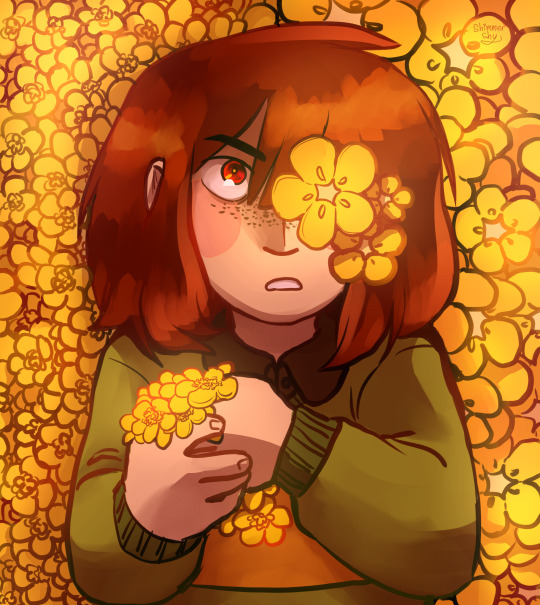
Buttercups and Golden Flowers
#i drew this mostly because i noticed that a lot of people mistake buttercups and golden flowers as being the same thing.#so i wanted to try drawing them like. distinctly different in the same image.#it's not a big thing but i do think the fact that they're different has some significance. or at least like. symbolic meaning.#my art#undertale#chara#chara dreemurr#safeutdr#something about the fact that they both look similar at least in color but one of them is poisonous.#the way golden flowers are clearly a positive symbol throughout the game and clearly heavily associated with Chara.#contrasted with the very negative connotations buttercups have. with asgore getting sick and chara using them in their plan.#you never see buttercups in the game. which makes it even easier to mistake the two. because we've only seen one kind of#golden/yellow flower. who's to say 'golden flowers' aren't just referring to buttercups? well.#why would there be golden flower tea if they were poisonous? why would chara want to see the golden flowers from their village if they're#the same kind of flower? they clearly have buttercups in the underground.#it feels almost intentional the way golden flowers are so easily mistaken for buttercups. or at least that the difference is so subtle.#it goes well with the way they're associated so strongly with chara who's also a very subtle yet important part of the narrative.#from a surface-level perspective the flowers that took their life and the one's they actually like/are important to them are the same thing#but when you pay closer attention to the narrative you can see the different symbolic meanings.#well. uhh I've thought about it too much don't mind me.#see i think about it from the perspective of chara being super adamant about them being two different flowers#and frustrated when anybody gets it wrong. because clearly. CLEARLY they're not the same.#'STOP confusing buttercups and golden flowers. i literally used buttercups to kill myself do you think i would still like them after that?'#'do you think i want to be associated with them? they're not the same!!'#<number one golden flower enjoyer number one buttercup hater.#i need a badge that says 'i have strong opinions about chara dreemurr because i kin them. i apologize for the wall of text' at this rate.
679 notes
·
View notes
Note
In your last ask, you said that the person's dream likely was just kinda whatever their brain had been thinking about that day. How do you determine which dreams have deeper meaning and which ones are just garble?
I love this question!

How To Know If A Dream Means Something Deeper
Disclaimer: You're the only one who can prescribe meaning to your own dreams, but if you ask for my help with interpretation this is what Im going to look for.
It's Unusual For You - Now it's important to emphasize the "for you" part of this. If I dream of worms coming out of a dog that might be a horrific omen of terrible misfortune to come to some people, but I work at an animal shelter. Dogs, and unfortunately worms, are just typical visuals I will see. It needs to be out of the ordinary. For me, I hate the snow, and I don't live near tall mountains. So when I had a dream about being at the top of a snowy mountain I knew to pay attention. Unusual people, places, animals, or themes can be early flags to take a closer peek but usually must be combined with some of the things below to make for a significant dream.
It Feels Different - Dreams carrying messages want to be noticed. They will feel more vivid and be more memorable upon waking. Something about them is tangible in a way most dreams are not. You just won't be able to shake it.
Patterns & Repetition - Your subconscious mind takes in a lot of input, and likewise filters through a lot of input during the day. But if you begin to notice something over and over and over again in your dreams, there is a reason for that. A dream can be super weird and feel super vivid, but if it is total nonsense that can be attributed to all sorts of conditions such as a warm bedroom, caffeine before bed, and so on. A dream or theme can't repeat itself multiple nights on accident.
Universal Symbolism - This is a bit of a nod to number 1, but if the dream is filled to the brim with personal characters, themes, and settings then it's likely all coming from within your brain. Now that doesn't mean a dream ISNT meaningful. Subconscious messages to the conscious are a HUGE part of dream interpretation, but it pretty much limits the chance that it's something external like the universe, a deity, or spirit trying to send you a message. (I could see where other people might disagree with this, but this is my take.) If you've never seen a hawk before, live in an area with no hawks, and haven't thought about a hawk at all and suddenly they're all up in your dream it might be a ring from someone else who does associate with them.
It's Going To Make Some Sense - Dreams have some wack-ass storylines that often are all over the place and have no linear progression but dreams with meanings will often take on a narrative. That's because our brains understand stories really well and if something wants you to understand, it will try to tell you in a story.
So for example
A dream I thought had personal meaning: An individual who told me about a reoccurring dream, with a specific theme that kept popping up, that made them feel a certain way, is someone who I determined was likely being given a message by their subconscious about a hard truth they didn't want to face.
A dream I thought had a spiritual meaning: Someone who approached me about a dream that was vivid, linear, but involved the wildest things they had never before had much exposure to but felt so moved and compelled by that it began to seep into their waking life. I determined it to be the recipient of a message from a particular deity and advised them to reach back out in return.
A dream I thought was just the brain processing: Someone who is just talking about the people in their lives doing some kind of weird dream stuff and they're worried about it because it involved people they know is probably just processing random thoughts they have throughout the day. Even if it's super vivid and felt super weird, it lacked direction and symbolism.
Of course, this is just my two cents, the only person who can properly and truly interpret a dream is an individual themselves- typically after keeping a dream journal and learning what is and isn't normal for them and what different personal symbols are and mean.
But you know... not everyone wants to spend countless hours studying this kind of shit or recording their every dream, and for those who just want someone who has to take a look for them- I love to try to help.
At the end of the day (or night) my number one tip for self-interpretation with no training is: Was that dream meaningful, and if so what did it mean? And if you're really having to scratch and dig to answer that question, it probably didn't mean very much at all.

#dream interpretation#witch#pagan#witchcraft#wicca#witchblr#occult#witchy#baby witch#paganism#dream interpreters#oneiromancy#oneionaut#ask box open#ask box#witch ask#witch asks
89 notes
·
View notes
Text
“Say No to This” has 2 different stories
This is probably due to my perception (both metaphorically because it’s been years since I first watched Hamilton and also literally because now I’m watching a clearer version) but this time around, I perceived Maria differently.
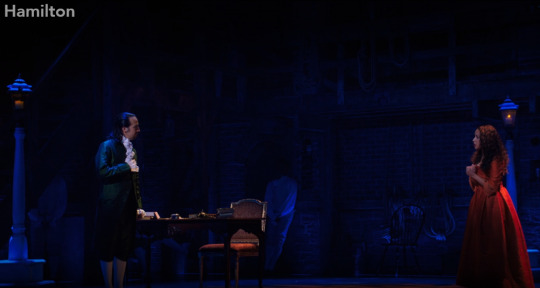
Before, she seemed more liked a device--she served to make me mad at Hamilton. And believe me, I was mad. (He cheated on Eliza!)
That’s really all the relevance I gave Miss Maria Reynolds. I think I low-key believed the set-up idea - she and her husband planned all this so they can profit off of Alexander - but either way I didn’t give much thought to it.
But look at her.
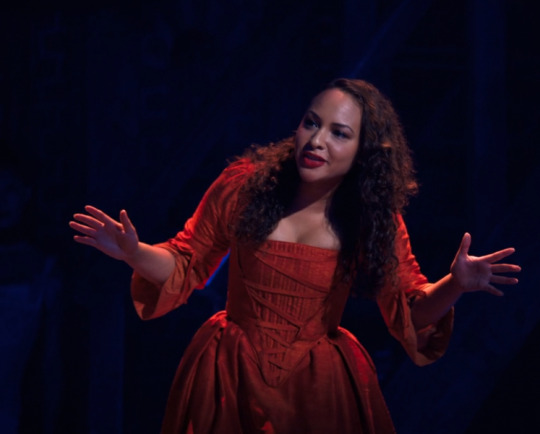
This is her movement at the line I’m so sorry to bother you at home.
I’d registered that line as seductive. Listening to the soundtrack, I’d reimagined her putting her hand to her chest, or looking forlorn, or something. But what does she do in the actual play? This juvenile little bop, like, It’s not really a big deal that I’m bothering you at home, right? It reminds me of a mischievous kid trying to get out of trouble.
This is mind, when she actually asks for help (My husband’s doing me wrong--beating me, cheating me, mistreating me) it registers as shameful and embarrassing. As if she were a fiercely independent latchkey kid ashamed at not being able to get out of this one by herself.
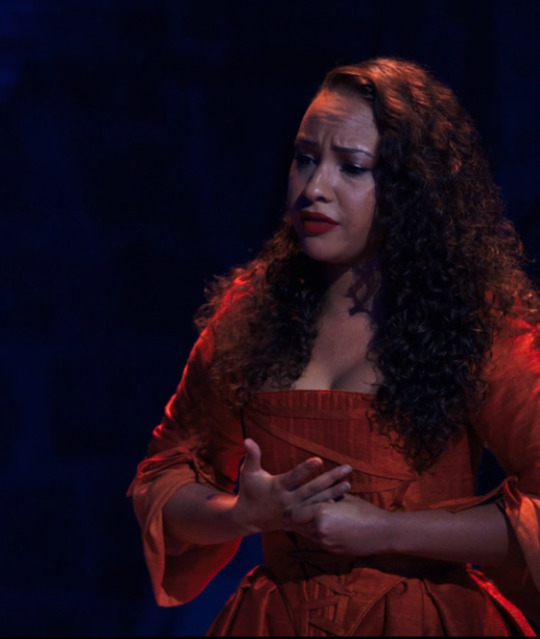
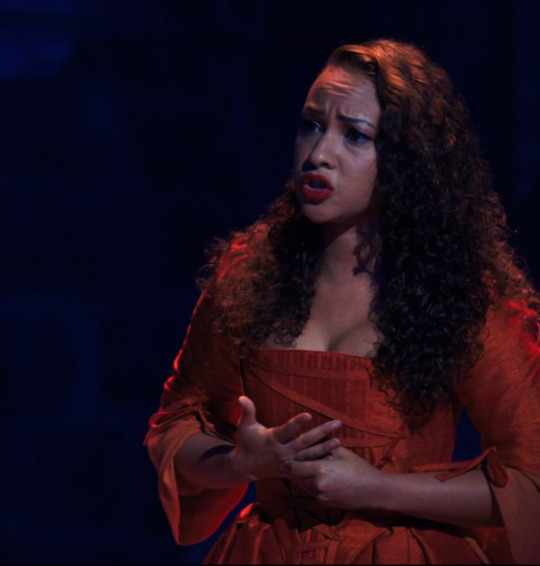
Her act of seduction is portrayed like this by Hamilton: I said, “Well I should head back home” / She turned red / she led me to her bed / let her legs spread / and said “Stay...”
When I was listening to the soundtrack, I was picturing, well, exactly that. What was Maria actually doing in the musical?
1) She gazes up at her house, not looking at Alexander at all.
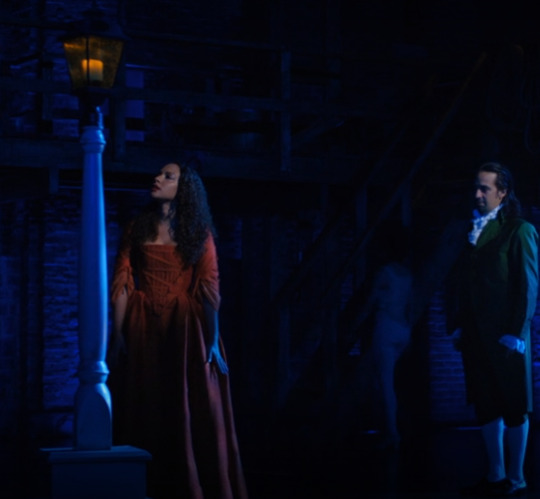
2) Exactly when he says he should probably head back home, she stiffens, and her hands slowly starts to clench around her skirts,
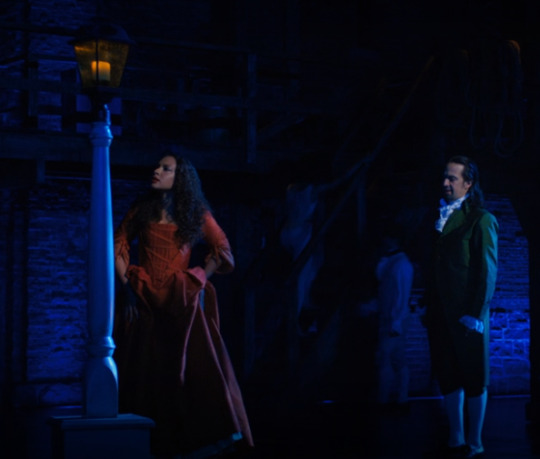
3) She whirls around suddenly and desperately, and begs, “Stay!”
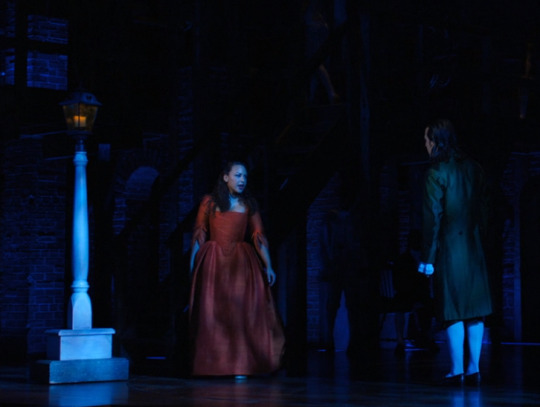
Do you know what that looks like? A person, a young person, who’s been abused and alone, and who’s latched on to the first semi-trustworthy authority figure she spots. He helped her, didn’t he? He actually did, and no one’s helped her in such a long time. And he was so nice, offering to walk her home like that. But now he’s leaving, and what if her husband comes back? What if she’s all alone again?
So she asks him to stay.
And she convinces him, it looks like, with the only way she knows how.
Notice her blocking during Hamilton’s internal monologue as he prays for the strength to not break his marriage vows to his wonderful wife and extols how helpless and hot Maria looks. She approaches him purposefully, and then a tad nervously (it looks like she swallows for a second), looks at his lips, edges closer, and then turns away at the last minute.
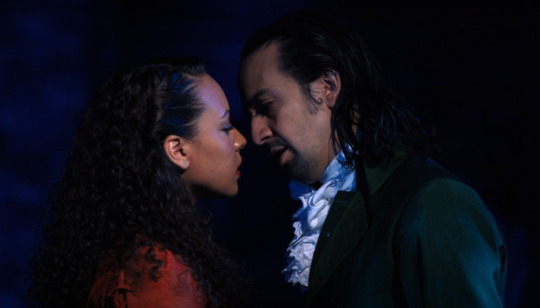
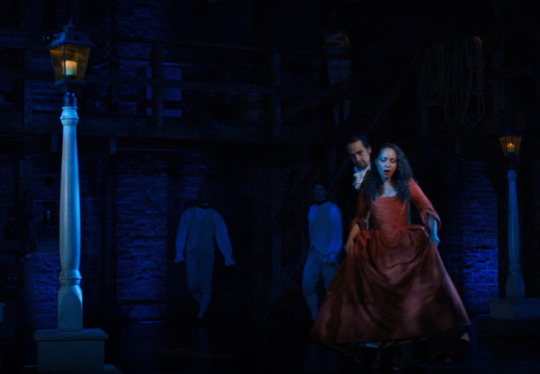
I remembered this blocking, actually. Vaguely. I remembered it as seductive, an attempt to lure Hamilton in and delay gratification, leave him wanting more, as she sings her quintessential waoaoaoh.
What it actually looks like? Her working up the courage to seduce Alexander (to get him to stay) and then backing out at the last minute. She moves away, looks out onto the street, and makes a decision. (Who would you rather contend with, Maria? The nice man who lent you thirty dollars or the husband that beat you?)
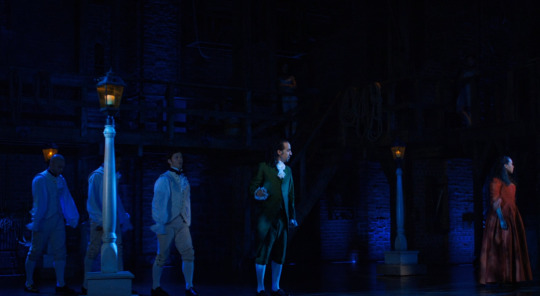
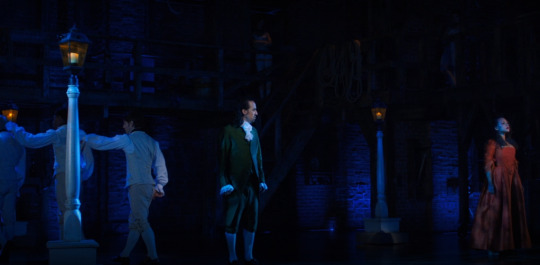
Look at that resolute tilt of her chin. She makes a decision.
The next face she takes on shows what decision she’s made:
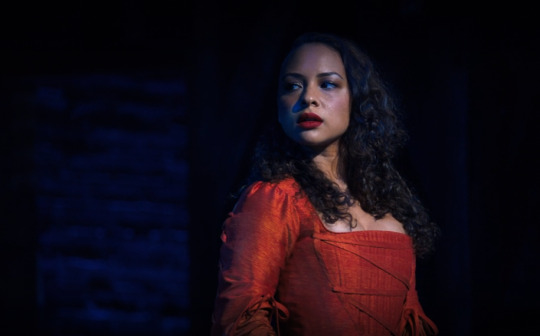
She strides to him, all purpose now, and kisses him determinedly.
Her expression right after it’s over?
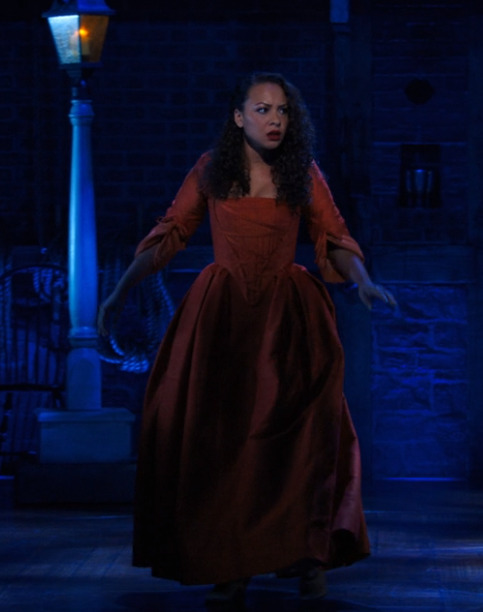
It looks more than being startled by Alexander letting go of her so quickly. Does this look like a woman who wants to seduce? Honestly, it seems more like a young person who had been relying on Alexander to say no. Who had been hoping for the authority figure to have helped her because he was kind, and not because she could seduce him. She was disappointed.
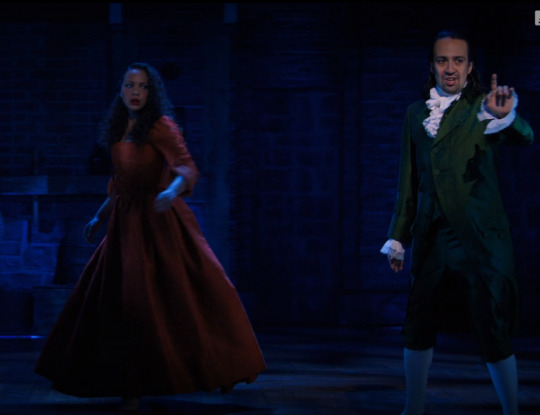
(Another observation during this sequence: Alexander’s Lord, show me how to say no to this begins when Maria is walking towards him aggravatingly slowly. It begins again when Maria backs out of the kiss, walks away from him, and looks out onto the street, and then it becomes in my mind I’m trying to go [go go go]. Aside from her actions, we really don’t have insight to what her thoughts are, but here’s a thought experiment: What if she’s thinking the exact same thing?
Lord, show me how to say no to this. I don’t know how to say no to this.)
This characterization that I missed the first time around - that she really is younger and less experienced than him - marks how insidious Hamilton’s adultery really was beyond the surface. He doesn’t just cheat on Eliza--he fetishizes Maria. He infantalizes and and sexualizes her at once. (My God, she looks so helpless. And her body’s saying hell yes.)
Now that I’m paying attention, it’s not even just her blocking. It comes out in the lyrics, too. The whole time, she’s addressing him as sir. No other woman in the play addresses Alexander like this. Yes, it’s kinky - we hear it’s kinky because we’re in Alexander’s perspective. Take that lens away and what we actually hear is a young woman addressing an authority figure.
What the hell, Alexander.
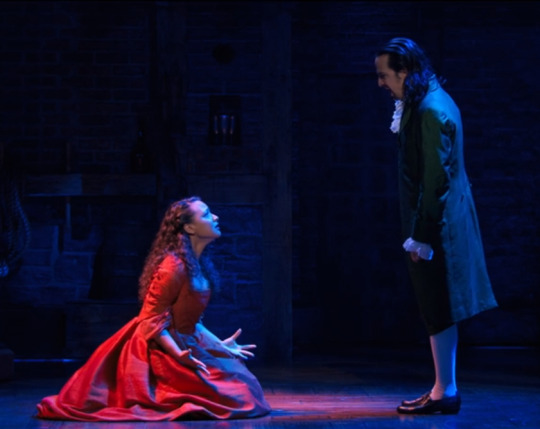
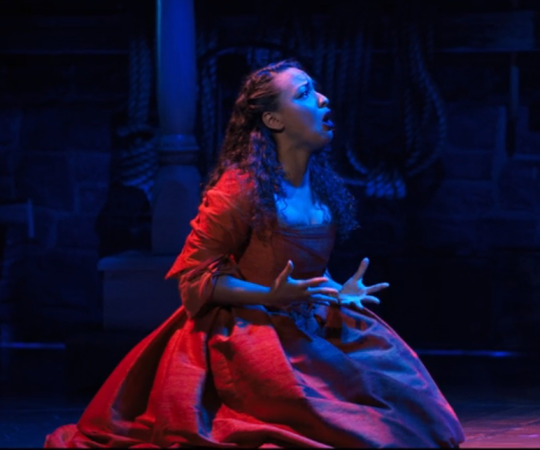
“I don’t know about any letter!”
I had forgotten that she screams this line, not sings it.
Look at Alexander’s reply and what he’s reinforcing here. Look at their priorities.
It’s obvious that Alexander’s being selfish. He’s thinking about himself, his reputation, how he’s ruined. And Maria’s concern?
Please don’t leave me.
It still comes down to that. She doesn’t want to be alone. She doesn’t want to be left to fend for herself from her brute of a husband. The man of honor who’d helped her is yelling now, and threatening to leave, but Maria has one more trick up her sleeve, and it’s not even a surprise. It’s the only trick up her sleeve she’s got. It’s the only way she can get men around her to treat her with even a smidgen of dignity.
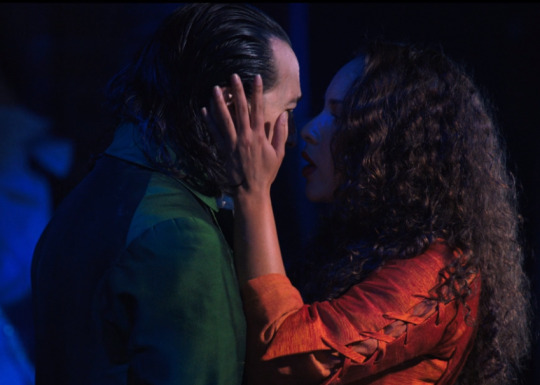
This also adds another layer to Hamilton. Unlike pretty much every other song, this one doesn’t quite line up with the narrator’s version of events. One could claim that the lyrics and the actions onstage don’t exactly match because that’s how it works--I mean, it’s not as if they could’ve shown the entire affair onstage. I might agree (and I do agree in part--I’m sure some of it is symbolism due to the medium), except all the other songs move in tandem with onstage events. In Alexander Hamilton, we hear moved in with a cousin / the cousin committed suicide and then we literally see the cousin hang himself, as well as Hamilton’s emotional reaction. Even more glaring, we hear Eliza’s then you look back at me and see Alexander glance at her. We listen to Angelica’s the conversation lasted two minutes, maybe three minutes and are witness to the important parts of that conversation.
Say No to This is different, and perhaps one of the reasons I didn’t catch what was happening was because there are two similar-looking, but but ultimately disparate stories. We hear about a temptress trying to trick Alexander out of money. We are shown a girl giving an authority figure what he wants so that he would help her.
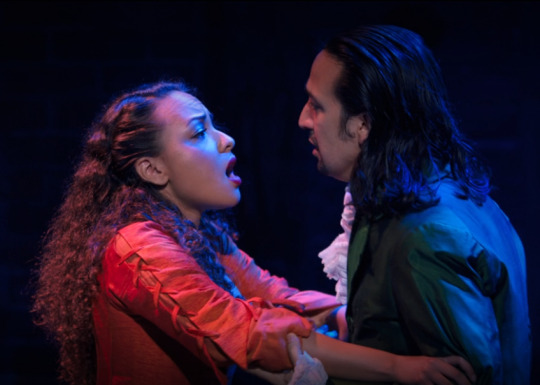
Maria doesn’t get to frame her narrative--we already know that from the soundtrack. What we don’t realize is how much of the narrative we hear is falsified, skewed by Alexander’s perception. What we don’t see is a young woman doing what it takes to survive, someone not unlike Alexander himself. We don’t see that because Alexander doesn’t bring himself to try.
If there’s one thing we learn from the musical, it’s that we don’t get to control who tells our story. Maria Reynolds, who gets almost no voice, knows and exemplifies this most of all.
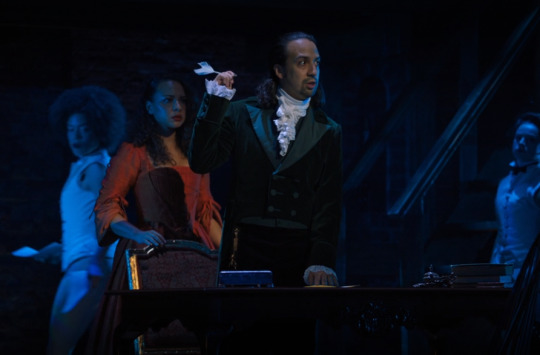
#AND SHE DESERVES AS APOLOGY#can you tell i became angrier as i wrote this?#Hamilton#Hamilton meta#Alexander Hamilton#Maria Reynolds#Say No To This
523 notes
·
View notes
Text
The Senju Brothers finding out their s/o is actually an Uchiha 🔥
This idea was requested by anon days ago (thank you anon, your idea is great, and sorry for the delay! 🙈) and I decided to do it like a list of hcs, but it’s kinda a scenario/narrative, so... it’s something between the two. I’ll be using the same “plot” for both Hashirama and Tobirama, but as you can easily imagine, their reactions will lead the story to different directions lol
Okay, let’s say that s/o deserted from the Uchiha for some serious sh*t or they just disagreed with some of their rules and went to live as an hermit and no one ever heard of them again. The Senjus met them during a mission by accident and they ended up helping each other during a fight, which led them to a friendship. S/o introduced themselves using a fake identity, of course, and told part of their story and the reasons why they were living in that region (like, they told the truth, but hiding names and places, so the Uchihas are never brought to conversation). Later, during a mission when they have to defend the Senjus, s/o shows their Sharingan and OH THE TENSION 🔥🔥🔥
PS: Dear anon, be warned that Tobirama’s part is friking long ok lol
Fandom: Naruto| Senju Brothers
Symbols: 💙 | ◻ | ▶▶
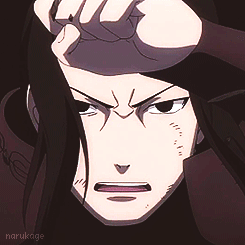
Hashirama
Sorry for this pic but this time we will have some DRAMA
It could be a big problem if the wrong people found out you were an Uchiha. You’ve been there for years, praying to be forgotten by your clan, but there was no way to be sure
This infuriated you more than anything, and it was one of the reasons why you deserted. You were tired of dealing with these battles, these rivalries. You just wanted to live in peace and to be seen as who you were, human. You wanted to be more than just a name
However, the longer you stayed isolated, the more you thought it was impossible. It only changed when you met Hashirama
He proved himself to be an honest man since the start, and to speak the truth you felt some sort of trust in him that you haven’t felt in a long time, even when you knew nothing but his name, Senju
You couldn’t tell if was because of his manners, his way to express himself or his motivations when he fought, but something in him made you believe everything was possible. He filled you with hope again
When you told him your story, he believed you
It was not the case you were lying, but you just couldn’t trust the first person who came to you. Your instinct of self preservation told you not to reveal all the names to a stranger, not until you knew more about him. Like, you sensed you were safe with him alone, but both of you couldn’t ignore the history between your clans
Still you felt bad for not telling everything to him
His mission in that place kept him there for a few days, during which you became good friends. But as time passed, he seemed to create excuses to not leave. At the same time, you got even closer, to the point that your connection couldn’t be called just a friendship anymore
It was when you realized you fell in love, and the feeling was mutual
One day, Hashirama came and said he couldn’t stay any longer. The village needed him, and he was missing his home. At the same time, he didn’t want to leave you. So he invited you to come to the village with him
Your heart was about to explode. You were alone, isolated and hopeless. Now you have not only hope, but love too. And this man wanted to offer you a home, a family and safety. It was too tempting, even for you. You accepted, and even under the risk of being recognized, you came back to your village
When you noticed you weren’t recognized, your fears diminished. You lived in peace by Hashirama’s side, and everything was good
Until that day when you went to a mission together, and during a fight you ran to defend him. You couldn’t control it; your instinct was too strong. Your eyes changed, and Hashirama saw your Sharingan
You saw surprise in his eyes, but also deception. You didn’t tell anything to him for all this time, and he wanted to know why. He had the right to know. He trusted you, he was like an open book to you, so why couldn’t you be the same to him?
When you came back home, it was even hard to breathe between those walls because of the tension. You knew what kind of conversation was waiting for you, and you couldn’t run away
Then you faced your biggest fear: you revealed everything, under the risk of losing the most precious things you had, Hashirama’s love and trust. You told your true name, your entire story and your reasons for deserting from the Uchiha. You told him you wanted to tell everything many times, but you were just terrified of his reaction and what could happen then
You even said he could send you away, or kill you or take you back to your clan’s elders for them to decide what to do with you, for anything was better than facing his hatred and despise
Hashirama remained in silence all the time you spoke. This lack of reaction caught your attention. When you looked at him, you saw he had tears in his eyes 💔
He was disappointed and angry, yes, but you saw in those eyes the willing to forgive you. This man just loved you so much. He couldn’t send you away or do any of the things you suggested. If he did, he wouldn’t forgive himself
So he asked for some time. He needed to process everything he just heard, to understand his own feelings, organize his thoughts and then decide what to do
When you talked again, you said you were going to work to regain his trust. It wasn’t going to be easy, but you were willing to do anything he demanded
When you asked if he was going to tell something to the Uchiha, however, Hashirama said no. Your life could be in danger if he did. Besides, you left them, you no longer shared their values and principles, you didn’t want to be associated with them, and he were going to respect this
Finally, you promise each other you would never let secrets stand between you again ❤
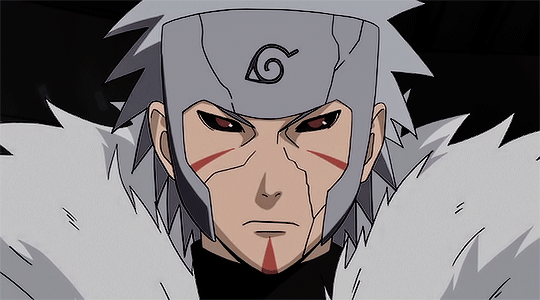
Tobirama
BRACE YOURSELF
You knew that, sooner or later, that was going to happen. When you first met Tobirama and understood of kind of person he was, there was no way for you to think differently. There you had a clever, observing man who would not be easily deceived
Though you met by accident, you managed to work well together, and that was why you managed to overcome your adversary. And he was paying attention to everything you were doing during the fight. Your manners, your fighting style, your experience as a ninja, nothing escaped his eyes
You were certainly a member of a clan, and an important one. Besides, there was your appearance: with your dark hair and your deep eyes, you resembled the majority of the Uchiha people and there was nothing you could do to disguise that. Not showing your Sharingan wouldn’t make a great difference
Plus: Tobirama being a Senju only meant he would recognize an Uchiha just by the way they smell
Right after you both acknowledge each other, he thanked you for helping him but didn’t seem to trust you until you gave him enough information about yourself and the place you lived, which sounded intrusive
Because of your circumstances, you had to be as suspicious as him. And he had his ways to make people talk, so you thought it was better to tell him what you felt safe to share. He listened to you but didn’t make it clear if he believed it or not
That irritated you a bit, but you remembered yourself that he was a shinobi just like you, and a shinobi needs to be perceptive. Besides, you were in fact not telling him everything. But, well, that was none of his business, right?
Tobirama told you he was going to stay in that region for a few days to complete his mission and then go back to his village, where his brother, the Hokage, and his partners were waiting for him. You agreed and you didn’t see each other for a while
Still, you didn’t know why, but you didn’t just forget about him as you did with other people you’ve helped in the past. Something in him caught your attention. Maybe it was the fact that he belonged to your old village, or anything else, you weren’t sure. This man was just… different
Later, you found out he has been gathering information about you with the local people: who you were, where you came from, when you came to live there, what kind of person you were to the people of that place, etc.
Next time you met, you ~casually asked how his mission was going, and if it was about seeking information for his village or for himself. It was so funny to see the blush taking over his face beyond the three red marks. Unable to hide his embarrassment, Tobirama confessed that the people who he talked to had nothing to tell him but the same things you’ve already told him
“Of course they don’t. I’ve told them the same story I’ve told to you”
In the end, Tobirama told you part of what was involved in his mission, and you said you had some information that could be useful. Turned out that you were the most helpful person he could find, and because of your skills and your knowledge (as well as your fighting abilities), his mission was finished half the time it would take
You didn’t understand exactly how or when you started dating. You just did. And when you least expected, you were back to your original village, married to him. It was strange that your life has changed so suddenly: first you were a hermit, away from your land and your clan, alone with a fake name; now you had a true home, loyal friends and a husband that loved and admired you. You used to think you didn’t deserve so much
The possibility of Tobirama finding out you were an Uchiha was always in the back of your mind, specially when you went on missions together
Of course, as time passed, you’ve come to learn to not depend too much on your dojutsu during fights, and your control over your Katon was clearly above the average. Besides, you were sensitive and passionate by nature, which resembled the Uchiha more than any other lineage. One day, Tobirama even said that you were an Uchiha from heart and soul, even more than he thought when he first met you. You didn’t know if it was a compliment, an insult or an invitation to tell the truth
So it wasn’t a great surprise for him when, during that mission, you had to defend him when he got injured and facing the possibility of losing the man you loved was too much for you to control, and your Sharingan appeared. At first you didn’t even think of it, but once you turned to Tobirama to see if he was ok and noticed the way he was looking at you, you realized what just happened
He didn’t talk to you for a long time after you came back home. You didn’t know if he was expecting you to start talking or if he was preparing himself to do so. Not knowing what was going on was killing yourself, so you decided to take the first step
It was the scariest thing you ever did in your life, but also the bravest. You came to him and said you were going to tell him everything. He nodded and waited, and you told him your entire story, since the day you left the clan until the moment you met. You told him your thoughts, your beliefs, your reasons, your feelings, everything. Nothing was kept hidden
When you finished, he didn’t speak for several minutes. You waited as long as you could, but then you decided to ask what he was going to do. You were sort of expecting an explosion of rage and frustration, but what came instead was worse
Through his tone, Tobirama made it clear how much he was disappointed with you, how much he despised your attitude, how disgusting it was for him to live with someone who didn’t have the courage to just come and tell the truth since the start, and that after all that he has seen, he was right to not blindly trust any Uchiha that appears on his way. Seeing him reduce you to the same flaws that led you to desert that clan was so offensive that it infuriated you, and you started a serious fight in the middle of that room
Your Katon and your Suiton almost destroyed your house
After almost killing each other becoming tired of this, you decided that for the best of you two, you had to leave. And if anyone asked, Tobirama could say the truth. At first, he tried to agree with this, but when you were about to pass the door, he held you tight and said he couldn’t just let you leave and carry on with his life as if nothing happened
You knew what was coming next: you crying in his arms > he saying nothing and leading you to your previous place > you making out and sleeping in the middle of the destruction room
In the end you didn’t leave, neither he revealed anything to the people of the village, including the Uchiha (who didn’t seem to remember you anyway). It took time until you restored your relationship, but you did it. In your case, love overcame history
PS: Hashirama came to visit you one day and was aware that a fight took place there, but he was too polite to say something
#naruto#naruto scenarios#naruto requests#hashirama headcanons#hashirama#tobirama#tobirama headcanons#senju#uchiha
222 notes
·
View notes
Text
Notes from Stephen King’s “On Writing” 07: The Revision Process

Next, King walks us through his revision process. He makes it clear that this method is not the only method. It is merely a method.
How Many Drafts?
“For me, the answer has always been two drafts and a polish (with the advent of word-processing technology, my polishes have become closer to a third draft).”
King admits that this number of drafts is not the golden rule. Kurt Vonnegut rewrote each page of his novels until he got them exactly the way he wanted them. This meant that when the manuscript was finished, the book was finished. (I certainly am not that big of a perfectionist, nor am I that patient lol.)
For beginner writers in particular, King offers the following advice:
“Let me urge that you take your story through at least two drafts; the one you do with the study door closed and the one you do with it open.
“This first draft--the All-Story Draft--should be written with no help (or interference) from anyone else. There may come a point when you want to show what you’re doing to a close friend because you’re proud of what you’re doing or because you’re doubtful about it. My best advice is to resist this impulse. Keep the pressure on; don’t lower it by exposing what you’ve written to the doubt, the praise, or even the well-meaning questions of someone from the Outside World. Let your hope of success (and your fear of failure) carry you on, difficult as that can be. There’ll be time to show off what you’ve done when you finish...but even after finishing I think you must be cautious and give yourself a chance to think while the story is still like a field of freshly fallen snow, absent of any tracks save your own.”
Basically, King just wants you to get it all out onto the paper, with no external forces influencing you (for better or for worse). Just get that first draft out, and then open it up for closer examination both to yourself and others.
Let It Breathe and Then Dig In!
Okay, so you finished writing the first draft! Celebrate! Rejoice! Maybe cry!
...And then throw that manuscript into a drawer, lock it up tight, and don’t look at it for a minimum of six weeks. And in the meantime, do something totally unrelated to what you wrote. Get into knitting. Write a short story that is nothing like what you just finished. It’s consumed you for months now--so give your mind and imagination some time to reset and chill.
King recommends a minimum of six weeks, but even longer is okay. Resist all temptation to peek at it. And once the six weeks have passed, do the following:
“Take your manuscript out of the drawer. If it looks like an alien relic bought at a junk-shop or a yard sale where you can hardly remember stopping, you’re ready. Sit down with your door shut, a pencil in your hand, and a legal pad by your side. Then read your manuscript over.
“Do it all in one sitting, if possible. Make all the notes you want, but concentrate on the mundane housekeeping jobs, like fixing misspellings and picking up inconsistencies. There’ll be plenty; only God gets it right the first time and only a slob says, ‘oh well, let it go, that’s what copyeditors are for.’
“If you’ve never done it before, you’ll find reading your book over after a six-week layover to be a strange, often exhilarating experience. It’s yours, you’ll recognize it as yours, even be able to remember what tune was on the stereo when you wrote certain lines, and yet it will also be like reading the work of someone else, a soul-twin, perhaps. This is the way it should be, the reason you waited. It’s always easier to kill someone else’s darlings than it is to kill your own.”
You’ll also be on the lookout for any glaring holes in the plot or character development. And if you spot any of these big holes, you are forbidden from feeling depressed about them. Don’t be hard on yourself. Everybody makes mistakes, and they can all be fixed.
Generally King goes through the first reading fixing all the superficial issues, like typos and unclear antecedents. But as he’s doing that, he’s also asking himself the Big Questions:
Is this story coherent?
If it is, what will turn coherence into a song?
What are the recurring elements?
Do they entwine and make a theme?
What’s it all about?
“Most of all, I’m looking for what I meant, because in the second draft I’ll want to add scenes and incidents that reinforce that meaning. I’ll also want to delete stuff that goes in other directions. There’s apt to be a lot of that stuff, especially near the beginning of a story, when I have a tendency to flail.”
I can understand what King is saying here about the flailing at the beginning. Because I do not plot when I write, I have ideas that crop up halfway through that would require being introduced earlier, for example. Or perhaps as my understanding of the characters evolved as I wrote more, I realize that they behaved out-of-character earlier on. This is certainly one downside to not plotting. But isn’t is also kinda liberating to be able to take detours and wind up at a different but equally interesting destination?
Okay. So go ahead and fix all of the issues you found, and your first revision is complete.
Second Opinions and the Second Revision
“Do all opinions weigh the same? Not for me.”
Now you’re done with the first draft. You’ve patched over any plot holes and smoothed out those typos and grammar mistakes. You’ve polished the symbols and themes until they shine.
Once this is done, King gives a copy of work to his wife and several close friends (4-8) to receive detailed feedback. In other words, he has several close friends beta for him.
“Many writing texts caution against asking friends to read your stuff, suggesting you’re not apt to get a very unbiased opinion from folks who’ve eaten dinner at your house and sent their kids over to play with your kids in your backyard.
“The idea has some validity, but I don’t think an unbiased opinion is exactly what I’m looking for. And I believe that most people smart enough to read a novel are also tactful enough to find a gentler mode of expression than ‘This sucks.’ Besides, if you really did write a stinker, wouldn’t you rather hear the news from a friend while the entire edition consists of a half-dozen Xerox copies?”
What he gets back is 4-8 very detailed and different analyses of what he wrote. What’s very important to remember is that every reader looks at a work through a different lens. If half of them say a character’s portrayal is far-fetched but the other half say the opposite, than their feedback regarding that point has balanced out. However, if the majority of them say that something doesn’t work, then King goes back and sees if he can improve it.
Also, different readers pick up on different details. This is the age of internet and now we are able to check facts whenever we like, but it is still nice to have something of a subject matter expert on hand, because they are liable to pick up on details that the writer may not.
For example, I often beta fanfiction for anime. I am fluent in Japanese, live in Japan, and have studied Japanese culture and history. While I would never claim to be a “subject matter expert” on Japan, I am able to make certain corrections regarding, say, the type of kimono a character should be wearing, that the writer would not have considered.
It’s very easy to accept feedback that deals with facts (i.e. a beta corrects you on the standard procedures for CPR). However, it’s much harder to handle subjective feedback (i.e. “The ending felt inconclusive.”). Having put as much work as you have into creating this, it can feel like a personal attack because this story is a very dear part of you. What do you do if your beta tells you something like this?
“Subjective evaluations are, as I say, a little harder to deal with, but listen: if everyone who reads your book says you have a problem, you’ve got a problem and you better do something about it.
“Plenty of writers resist this idea. They feel that revising a story according to the likes and dislikes of an audience is somehow akin to prostitution. ... But come on, we’re talking about half a dozen people you know and respect. If you ask the right ones, they can tell you a lot.
“Do all opinions weigh the same? Not for me. In the end I listen most closely to [my wife], because she’s the one I write for, the one i want to wow. If you’re writing primarily for one person besides yourself, I advise you pay very close attention to that person’s opinion. And if what you hear makes sense, then make the changes. You can’t let the whole world into your story, but you can let in the ones that matter the most. And you should.”
I think, especially in the age of prolific fanfiction in which the author usually updates as they write the story, the author feels a lot of pressure from their readers. Readers chomping at the bit for the main characters to have a naughty scene, or demanding to know about that one secret thing that you keep alluding to. A lot of fanfic writers struggle to tow the line of “writing a good story based on reader feedback” and “pandering.”
My advice to fanfic writers out there is to tell those thirsty readers to read a one-shot if they’re looking for a quick fix of smut, and to have some goddamn patience. You’re trying to tell a story, one that builds and progresses, and that takes time. Don’t give in to those “OMG MAKE THEM KISS ALREADY” reviews. But if a lot of readers say something like, “I feel like this character wouldn’t do that,” then perhaps you should re-evaluate that.
On Pace and Reducing Glut
“Formula: 2nd Draft = 1st Draft - 10%.”
So now you have your first draft done. You have your feedback from your trusted betas. And now you need to go and make the final changes.
King states that you should rely on your most trusted betas to gauge whether or not your story is paced correctly and if you’ve handled the back story in satisfactory fashion. “Pace” is the speed at which your narrative unfolds.
”There is a kind of unspoken (hence undefended and unexamined) belief in publishing circles that the most commercially successful stories are novels are fast-paced. I guess the underlying thought is that people have so many things to do today, and are so easily distracted from the printed word, that you’ll lose them unless you become a kind of short-order cook, serving up sizzling burgers, fries, and eggs over easy just as fast as you can.
“But you can overdo the speed thing. Move too fast and you risk leaving the reader behind, either by confusing or by wearing him/her out. ... I believe each story should be allowed to unfold at its own pace, and that pace is not always double time. Nevertheless, you need to beware--if you slow the pace down too much, even the most patient reader is apt to grow restive.”
So how can you strike a happy medium? Rely on your most trusted betas and their input. King says, “Every story and novel is collapsible to some degree. If you can’t get out ten percent of it while retaining the basic story and flavor, you’re not trying very hard. The effect of judicious cutting is immediate and often amazing. You’ll feel it and your betas will too.”
On backstory, King issues some opinions and advice:
It’s important to get the backstory in as quickly as possible, but it’s also important to do it with some grace.
A reader is more interested in what’s going to happen instead of what already did.
Even when you tell your story in a straightforward manner, you’ll discover you can’t escape at least some backstory.
“The most important things to remember about backstory are that (a) everyone has a history and (b) most of it isn’t very interesting. Stick to the parts that are, and don’t get carried away with the rest.”
Source: King, Stephen. On Writing: A Memoir of the Craft. Hodder, 2012.
#creative writing#creative writing methodology#creative writing theory#writing#write#writer#author#writeblr#how to write#writing tips#writing advice#writing resources#fiction#horror#fantasy#fanfiction#writing fiction#writing horror#writing fantasy#writing fanfiction#writing anything#revision#story revision#rough draft#story editing#stephen king#writing prompts for friends notes from on writing
527 notes
·
View notes
Text
Fruits Basket, SE02, Ep24
This is a buildup ep for the finale. looks like furuba’s tradition for awkward buildup eps continues as this ep is clearly divided into two parts: machi & zodiac banquet.
-Killing the Vibe (furuba style):
Usually when writers buildup an emotional moment, they either go with it right away or if it is not its time, they slowly dissolve it or gradually redirect the story somewhere else. But the most important thing is that you hold on to the feeling they worked so hard to build but know that it will be dealt with later. Usually this is done with minor visuals such as quick flashback to the main event & the character taking deep breath ignoring it. But it is acknowledged that now it is not the time. Furuba doesn’t do that. If they build high moment & decide it is not the time to continue with it, they drop it abruptly, using the ending ost as a closing sign....which is odd cuz this is not episodic eps but continuing plot. They did it twice now: (a) tohru’s nightmare ep 19. it was treated as cliffhanger, but the next, we opened with yuki’s narrative where we see tohru normal. I know tohru’s issues will be dealt with later, perhaps season 3. But the nightmare moment was left hanging weirdly!! we never saw tohru deciding not to focus on it or anything! then (b) the kyo/tohru moment on stage & the symbolic tearing image ep23. Big moment which I know will be focused on later. But it is so freakin odd that we see them so normal in their daily activities..as if nothing happened. Not a slight visual hint that either one is troubled... I praised how in ep, 23, they showed tohru face worrying abt bits & pieces here & there. These visual hints connects the plot.. For a moment I thought Cinderella play is a filler!! but I don’t think so, since 3 major things happened (Tohru’s near confession, machi’s opinion of yuki, arisa’s recorded outburst) two of which dealt with this ep. I know they want the focus to be on yuki, seeing that his plotline is moving smoothly without awkward breaks, but why not smooth out the other’s plotline with minor visuals without the jarring jumps. Ending ost is not automatic shifts in continued plot. Oh well, it is a minor thing I felt, no big deal.
-Machi pov is here!:
I never expected to see machi today! nice surprise! So machi is not only lonely, she lives alone! that’s odd & tragic! how can a junior high school student live alone? since when was she living alone? & her mom calling to check on her or insult her or scold her! I never wanted a phone call to end this fast. Machi’s monologue was amazingly done. Rather than describing her feelings to us or stating what we are already seeing, the words came cold.. automatic.. slow.. without much emotions. Exactly imitating how machi feels abt herself. DULL. She never thought abt things such as fave color or fave place. never thought abt anything that requires personality or preferences. The imagery they used while she was walking in the street is epic! It explained her mentality! honestly even if she said nothing around that time while she was walking, the image would’ve done enough! Machi was able to see the change in yuki cuz she was able to sense that yuki too was dull/boring or felt he felt so. Now he laughs, jokes, interacts, & joins outside school activities. Negating the dull persona. Now, it is only her. machi questions if she can do the same but her question comes out loaded with her negativity. Instead of can I do the same? it is “ why Am i here? Her bad habits are pulling her back & resisting the change.
- Since they’re deciding to embark into the romantic aspect of mach/yuki & to further add contrast to his interaction with tohru, machi is shown so struck by yuki’s presence, she falls. Typical romantic moment that I appreciate for machi who thinks she isn’t typical girl. but dull girl. Yuki finding the leaf & being happy that she treasures it adds to his self-esteem as it tells him that he is worthy to be treasured. I love machi’s indecisive responses! It gives her personality! as she is reluctant between denying or telling the truth. She was never in such situation, so she doesn’t know what to do!! blushing red like her leaf, machi didn’t only go with friends, she also learned her fave color! yuki, developing the future boyfriend detective sense like kyo, guessed it that machi likes red. You remember things abt ppl you find interesting! Machi felt that perhaps to yuki she is not dull, but interesting enough to want to learn things abt her!
-Tohru is a grown woman!!!
trust me to take 5sec interaction that involves my girl & write a deep analytic paragraph! Call it building sandcastles out of nothing but I don’t care! XD. tohru deserves some spotlight! I’m a bit disappointed that the scene is shown form a far to include yuki & shiggure..(WHY???. They can have their moment later! let my girl have a screenshot for a change!!) & the art quality is the lowest in the ep, lol & but whatever~~~ let’s focus on the positive side! my tohru bought sth for herself!! tohru who spent her hard earned money on buying candy ingredients for the filthy rich sohma’s instead of paying her tuition fees?!! tohru who wore a worn out swimsuit for school & didn’t see the value in buying new one ?! tohru whose school bag have seen better days as hiro said?!! tohru bough herself a scarf with pompom!!& she’s PROUD!! & she goes & shows kyo!!!! cuz she loves him & cuz in SE01 he was mad she doesn't buy herself stuff & cuz she knows he’ll be proud of her & cuz she want show off her cuteness & get his attention & cuz she wanna tease him!! Did you see my girl deliberately hit him with the pompom??? my girl is feisty!! She teases!! Tohru has this feisty, forward personality that she hides but peeks in certain instances!! Like when she teased kyo that he’s still scared of the stain on the wall..like when she calls him cute later this ep!! I’m so happy for every tiny teeny moment of tohru where she is herself & not the worrying mom or friend, when she is focused abt what she shows & what she wants & right now she wants kyo to notice her! GIRL HE ALREADY DOES! you are killing him already tohru..he’d be dead by now if he wasn’t a cat with 9 souls! XD.
-Yuki is leaving Akito’s side:
coming to the big moment in this ep. Akito is loosing yuki. Not only yuki decided by himself to attend the banquet that he avoided last year, he also talked to akito & forgave him for everything before. Yuki is letting go of the past. Forgiveness is a cure ppl! it’s the hardest achieved cure. it cuts the ties to negativity & free the person from the painful feelings. Akito knows she’ll be loosing a zodiac member soon! she reacts the same way she did with hatori! violently resisting change, violently making a statement that I’m the ruler of you. However, unlike when it was hatori, no one came to her. Kureno stopped her. but the rest went to yuki, to the rebel, to the one who caused her pain & rage. Akito is not only loosing yuki...she is slowly loosing all of them.
- Yuki continues the next step in his growth & frees hatori from his sins. By allowing himself to accept that he is not a helpless victim, yuki was able to see the others plain as well. Before, in his mind, he was the only one suffering, others are cruel, but now, he sees the criminal who erased his friends memories was also suffering all along. Perhaps yuki thinks that akito is suffering too? That’s why chose to forgive her & tell her that I don’t hate you anymore or hold grudge.
Side Notes:
I’m so glad kakeru had so little to do with machi & yuki interaction here. He is a character that demands spotlight & if his role was bigger, machi would disappear, it will be another yuki/kakeru moment. Also, since machi/kakeru parallel aya/yuki, you bet kakeru will be more involved between them in order to get closer to his sister & fix the gap like aya did, so I appreciate the moment of only yuki/machi now as it is unique moment without any parallels involved.
After learning of Shigure’s correct line, I can now see how things would’ve been better for akito, if she learned from yuki’s rebellion. loosing one is less painful than loosing them all, which she will. Shigure was eager for her to be spared the pain. or he might be eager for sth else entirely! but he wants this to end.
Shigure sure wasn’t himself this ep! he was restless & his jokes were all over the place, he nearly caused a misunderstanding between hatori & Mayko. I think shigure is hearing the curse breaking!!!!!
Rin & kyo!!!! I never knew I needed this!!! like last ep, I was celebrating hana & kyo, & the return of kyo & haru!! but rin & kyo is unique duo since it is not a teasing dynamics! it is a we-are-too-similar dynamics! XD
Kazuma is luv!! ugh!! my heart! what a man!! so caring & kind & ever so gentle! look at him going to rin to invite her! no kid should be alone in new years! look at him teasing his son!! look at him out polite tohru! just look at him!!!
I appreciate that the boys (kyo,yuki.haru,momiji) have different body types from each other. however, since kyo’s body changing is mentioned in the story many times, they focused on showing him growing since the 2nd ep of season 2 & more so in the beach arc & they steadily continued ever since!!! this ep, even with the low quality they showed his Adam’s apple & he is taller next to shishio. Also his baggy clothes help defy the lanky art style. With yuki, since his beauty is mentioned in the story, they’ve been focused on his face, giving him HD quality beauty all the time, but not much when it comes to his body. but today, he looked a lil bit older in machi’s scene? I duno if it is the new clothes or they’re finally allowing his body to grow?! I hope so. They are still making him so lanky as his legs were only a bit meatier than machi’s in the fight scene, but hey lankiness is the show’s art style, just look at hatori </3. They focused on making Momiji baby as it is mentioned in the story that he doesn’t look like a highschooler at all, but I swear he looks a bit older this ep!! right???
Speaking of hatori, hello there~ doc~ I never knew I needed hatori in Japanese clothes this much! It hid the lankiness & gave him the adult manly look he deserves!! so hot!!! I heard his grunt in my heart as he took his clothes off! XD. Soyou’re attached to the school sensie now~~ a lit bit worried your filthy buddy is putting hands on her..huh? oh!, if only you knew that your goofy pal is the master mind behind your new love story! I think he knows tho~
I never expected machi to be that cute!!! machi/yuki is so cute!
Rin sleeps sitting...like a horse? rin didn’t feel haru? i thought horses are as jumpy as cats! lol
Tohru & kyo are having quality flirting time with no interference from either shigure or yuki. lol.. shishio is amazing! XD
Kureno has the DVD now..let the war begins!!!
30 notes
·
View notes
Text
Ranking : The Coen Brothers (1954/1957 - present)

Directing a film can be one of the most vast, task oriented and stress inducing undertakings imaginable, which makes it odd that more directing duos, specifically sibling duos, do not exist. Sibling duos like the Wachowskis, Hughes, Farrellys, Safdies and even the Zellners have made names for themselves, but one set of siblings easily towers above the rest : the Coen brothers. With nearly 20 films under their belt, and nearly as many stylistic varieties and storytelling approaches found within, it is hard to argue the impression they have left on moviegoers worldwide over the past nearly four decades they’ve existed professionally. With such a stellar record of films under their collective belts, I’ve decided to do the most stress-inducing task of all : rank these films from least to most favorite.
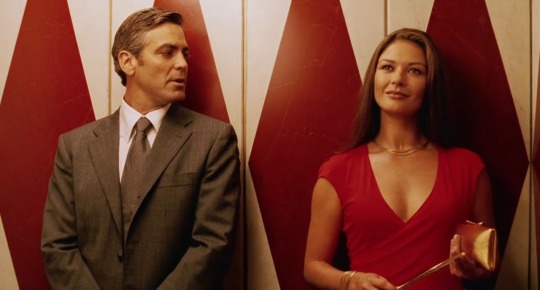
18. Intolerable Cruelty (2003)
For a duo with so much distinct style and flair for storytelling, this film feels the least like a Coen Brothers film. If anything, this feels like a script that sat on a shelf in pre-development hell, possibly for years, only for someone considering themselves a bit of a ‘maverick’ or ‘forward thinker’ to discover it and think that a dose of Coen Brothers magic could save it. Even with the star power of George Clooney and Catherine Zeta-Jones behind it, this one feels a bit too ‘by the numbers’ to stand out from an oeuvre that nears perfection.
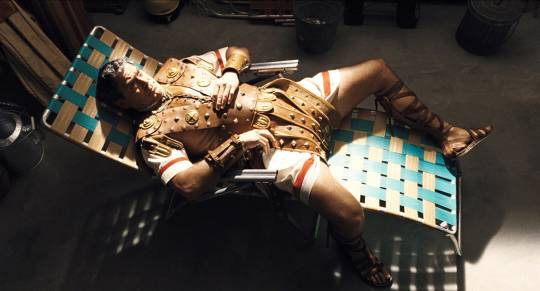
17. Hail, Caesar! (2016)
I’ll be completely honest with you all... I don’t remember much about this film. I remember enjoying it, but I don’t remember being blown away by it. I remember enjoying the colorful display of old Hollywood, and it’s always refreshing to see George Clooney lean into roles that border upon slapstick. For as much as I found this film not all that memorable, however, it stands above Intolerable Cruelty simply because it does not trigger bad memories.
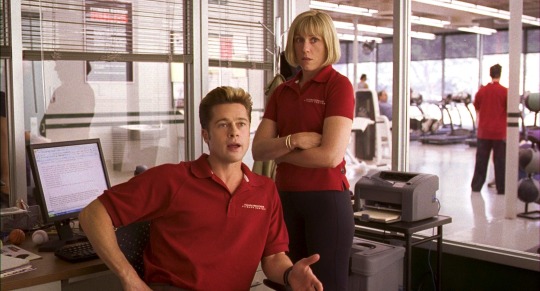
16. Burn After Reading (2008)
This film is what Intolerable Cruelty wanted to be... a property that is a hair closer to by the books, but full of a screwball approach that heralds to a forgotten era of film while using an incredibly stacked cast. Of all the Coen Brothers films I’ve seen, Burn After Reading feels like the property that all involved enjoyed making the most. Like many of the Coen Brothers films, the cast on this one is mega-stacked, and from top to bottom, everyone involved shines in roles that go against their standard types, or amplify the most off-beat aspects of their performing ability.
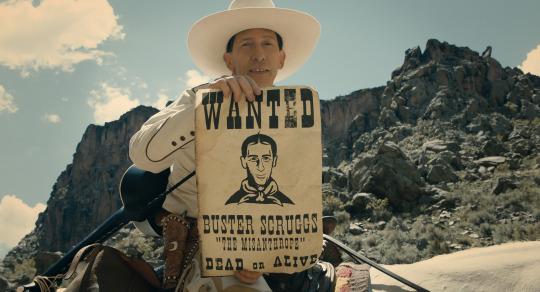
15. The Ballad of Buster Scruggs (2018)
The fact that Netflix was able to pull the Coen Brothers for a film is a win in itself, and with the duo choosing to do an anthology piece, Netflix was primed to maximize on their investment. While highly entertaining, however, the anthology nature of the property leaves it feeling a bit unfocused and disjointed at times... none of these stories really had enough meat on the bone to be expanded into feature-length films of their own, but for some reason, all parties involved passed on the opportunity to make a multi-episode serial rather than a film comprised of multiple tales. While using variance in storytelling methods and visual styles may work for some less talented directors, in the case of The Ballad of Buster Scruggs, it feels more like snack-sized bites in the place of true sustenance.
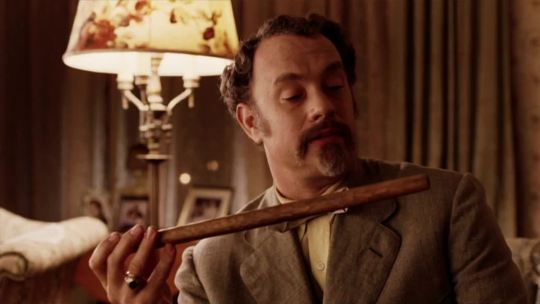
14. The Ladykillers (2004)
On paper, this film should have been a disaster. The Coen Brothers generally opt for original stories, so the fact that they chose to adapt such an obscure 1950s property for the modern day was strange, especially in light of the fact that most every element with the exception of Tom Hanks’ character was given a modern update. Somehow, despite all of this oddness, The Ladykillers managed to capture a sense of the classic Coen Brothers slapstick comedy that they famously established themselves with early on in their career. Tom Hanks is given the green light to go completely ridiculous, and to much of the viewers’ delight, he does so with great aplomb. His supporting cast shines, the comedic turn brings new energy to the story, and the southern gospel setting brings a rich sense of spirituality to an otherwise run of the mill film.
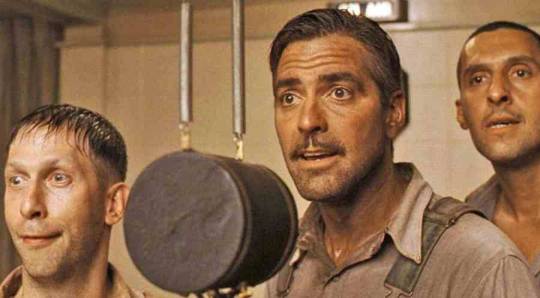
13. O Brother, Where Art Thou? (2000)
The Coen Brothers were essentially household names by the turn of the 20th century, but O Brother, Where Art Thou? propelled them into a legendary status. The grassroots mix of The Odyssey and the Robert Johnson crossroads legend took on a life of its own, leaving behind a soundtrack that birthed an entire generation of folk and bluegrass enthusiasts, as well as a film that showed the world George Clooney’s comedic chops. Much like The Ladykillers, O Brother puts viewers deep into the unfamiliar territory of Southern ‘discomfort’, with the African-American experience playing a major role in the narrative. Of all the Coen Brothers films one could use to introduce a stranger to their catalog, this one may be the best, as its infectious nature and stunning look leaves an impression on most anyone who has the pleasure to view it.
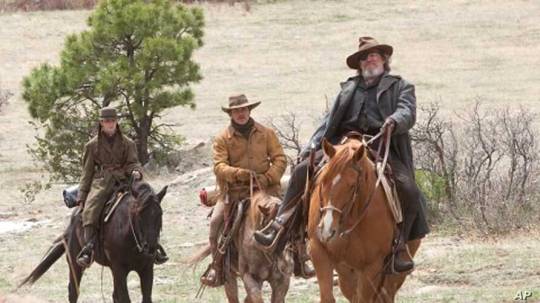
12. True Grit (2010)
The Coen Brothers had already covered a wide bit of genre ground within their first three decades, but surprisingly, they’d not done a true western up to that point (though many argue that No Country For Old Men is a modern take on the western). Therefore, when it was announced that their first western would be a remake of the iconic John Wayne film True Grit, many were surprised, and curious if they could pull it off. Not only did they pull it off, but in my humble opinion, they made a version that more than holds its own against the original. For the handful of big name and seasoned actors that signed on, it was the breakthrough performance of relative newcomer Hailee Steinfeld that outshined all. While The Ballad of Buster Scruggs was a fun revisit to the world of the western, True Grit was the kind of achievement that makes me want more traditional westerns from the duo.
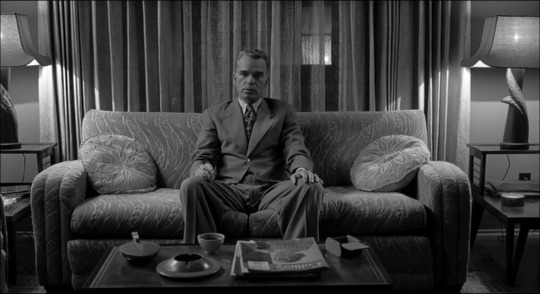
11. The Man Who Wasn’t There (2001)
Listing the Coen Brothers films is by far the most difficult ranking I’ve done to date, and the first film that really gave me trouble in terms of placement was The Man Who Wasn’t There. Personally, I find this film to be captivating and nearly flawless... Billy Bob Thornton’s detachment is rich and intrusive, which makes it all the more sinister when he does choose to exude even a hint of passion about something, be it positive or negative. The black and white photography, in league with the tone of the film, puts me in the mindset of films like In Cold Blood, and some of the sequences in the film stand out as some of the most iconic in the world of Coen Brothers films, especially the car crash. For a classic-style film noir, a genre that anyone with half a brain knew was a slam dunk for the Coens, the duo went above and beyond to both modernize and wholly embody the style. One of several Coen Brothers films that sits with you long after the final credits have faded away.
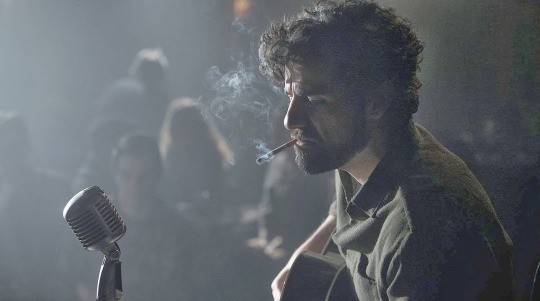
10. Inside Llewyn Davis (2013)
If this isn’t the darkest comedy in the Coen collection, it’s certainly giving the number one contender a run for its money. The intimacy of this film is unmatched within the broader collection of Coen characters, excluding The Dude, but the difference between Llewyn and The Dude is the personality equivalent of the difference between oil and water. You may marvel at Llewyn’s talent, but all the while, the film is screaming at you that “THIS IS A CHARACTER YOU SHOULD NOT ROOT FOR”. The symbolism found in the film is minimal while being incredibly effective in how it punctuates Llewyn’s personality and character, and the story structure is an equally subtle swerve that baits you into paying deeper attention, only to realize that the setup was the punchline the entire time.
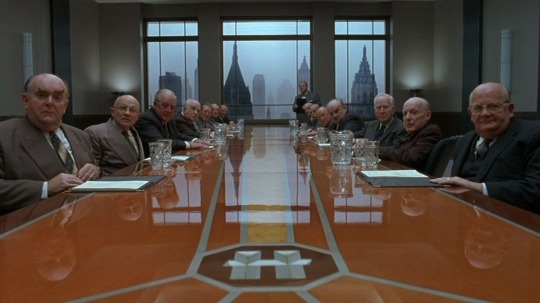
9. The Hudsucker Proxy (1994)
I’m a sucker for a Coen Brothers comedy, especially the ones that play like human cartoons, and one of their absolute best was The Hudsucker Proxy. The writing on this film is so tight that it would absolutely pop if it were any tighter. The entire A Christmas Carol-esque approach to the story makes it a wonderful moralistic tale that makes people laugh so much that they often don’t realize they are being taught a lesson about morals, integrity and self-respect. Tons of familiar character actors fill the frames, everyone tasked with supporting roles fit firmly and comfortably into the created world, and the man trio of Tim Robbins, Jennifer Jason Leigh and Paul Newman are functioning on genius levels of performance... especially Jennifer Jason Leigh. While not quite a holiday movie, there is enough of a holiday sense that it could be shoehorned into a seasonal viewing, but any time set aside for this gem is the right time to watch it.
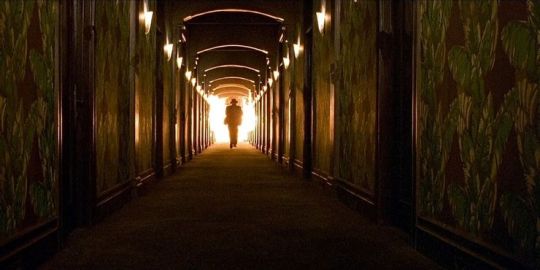
8. Barton Fink (1991)
In my humble opinion, this may be the strongest end to end performance from John Turturro in his long and storied career. As clear-cut fans of film, it is always a pleasure to see the Coen Brothers explore the world of film, and by using this approach, they are able to tell a bold, brash and haunting tale about the issues that come with assumptions about character and talent. The takes on Hollywood and the indifference of those in power, especially when it comes to assisting young and promising talents that may one day usurp them, and powerful. The real bow on the story, however, is the larger than life presence of John Goodman, who goes from being a slightly aggressive and overbearing sense of support to a literal madman by both name and action. For a film that mainly consists of individuals talking to one another about passion, talent and secrets, there is a kinetic energy that feeds the forward momentum of this movie, and for that, it stands out in the Coen collection.
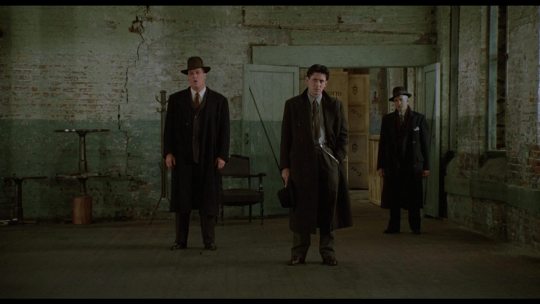
7. Miller’s Crossing (1990)
It’s not surprising that the Coen Brothers could make a compelling and memorable gangster film, but I don’t think that anyone expected a film as vicious and dark as Miller’s Crossing. For a duo that generally relies on nuance and contemplation to get their points across, this film certainly proves that they are more than capable of excelling in the direct approach as well. The era-specific costuming is outstanding, the murky city areas stand in stark contrast to the woods of the titular Miller’s Crossing, and the sheer volume of bullets are a stark reminder of the Prohibition-era story we are viewing. Gabriel Byrne shines in his lead role, bringing a world of fury, deceit and mistrust in tow with him. The iconic hat blowing in the wind serves as not only the biggest memorable moment from the film, but possibly also the single moment of peace and beauty found in a film that holds up a dirty mirror to a dark world.

6. A Serious Man (2009)
Of all Coen Brothers films, this is easily the most underappreciated and slept on of the bunch. I’m a sucker for movies that embrace Murphy’s Law, and when mixed with the parable nature of the Book of Job, we are presented with a darkly comic and relatively unique version of the hero’s journey. The way that the personal, professional and philosophical problems pile up on Michael Stuhlbarg’s Larry are meant to be felt by the audience, and the way that his bad luck boomerangs out into the world during the film’s resolution must be seen in order to be believed. The way that destiny and chance dance around one another in this film is narratively breathtaking, and for such a subtle film, it is a truly remarkable achievement.
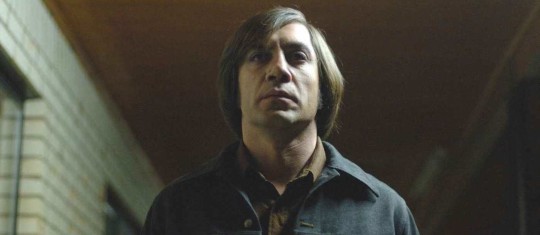
5. No Country For Old Men (2007)
When you think of the Coen Brothers, you don’t necessarily think of evil incarnate, and yet, the duo succeeded in capturing a character in the form of Anton Chigurh, the closest thing to the Terminator that the duo has ever created (to my knowledge). The story is a wonderful, subtle tale of how the times can change into something we don’t recognize before we recognize the change, but it is easily Javier Bardem’s iconic performance that gives this film all of its power and ominous energy. His unyielding forward momentum, his disdain for obstacles in any form, and his disregard for human life are enough to instill real fear into those who partake in viewings, and his presence will more than likely haunt you far beyond completion of the film. A true modern-day masterpiece that would have been higher, if not for...

4. Blood Simple (1984)
What a powerful debut, and one that not only hinted at, but outright put the spotlight on the promise of the Coen Brothers when it came to stark visuals and stunning storytelling. For such a simple, small scale story, the tangled web that is woven is a slippery slope of deception and distrust that leaves little to no survivors in its wake. The scale of the film is deceptively small, but the quality shines in every aspect that it can. Seeds are placed that pay off wonderfully, and the color palette presented gives the film the feeling of a Technicolor film-noir. Much like A Serious Man, Blood Simple deserves to be talked about and held up much more than it is by fans of film.
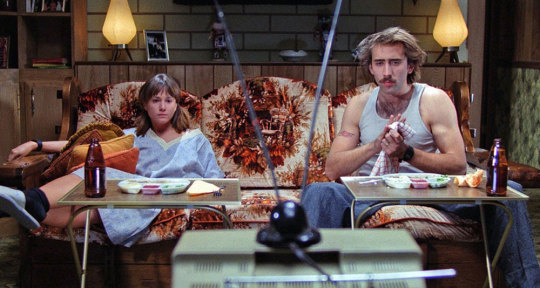
3. Raising Arizona (1987)
What a wonderfully ridiculous movie about something as simple as the trials and tribulations of navigating love, marriage and parenthood. The most hilarious aspect of this film, in my opinion, is how it feels like a living and breathing cartoon, both in terms of the character performances and the outrageous events that take place within the world of the film. Nicolas Cage is operating on a completely different level, Holly Hunter is equal parts charming and hilarious, Trey Wilson is wonderfully over the top, John Goodman and William Forsythe bring excess hilarity to the wild proceedings, and Randall “Tex” Cobb is downright iconic in terms of his ridiculous character. The pacing of the film is breakneck and feverish, the comedy hits never stop coming, and the utter charm emanating from the midst of the caper presented is infectious. As a second film, this could not be any more different than Blood Simple, and yet somehow, it connected so vividly with viewers that it remains a must-watch film to this day.
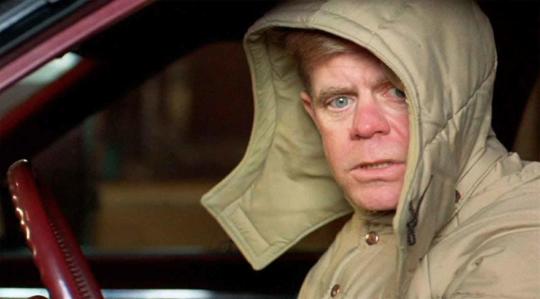
2. Fargo (1996)
What is there to be said about Fargo that has not already been said? For a duo with more iconic films to their name than some directors have completed films, Fargo was an immediate signal that the limits of the Coen Brothers’ creativity and skill had not even began to show its full breadth. Within less than five years of release, the film was already heralded as a classic (of all-time, not just modern day), the mystery surrounding its possibility of being based on a true story built a world of intrigue around the movie, and it has gone on to create a universe of its own in the form of an FX TV show that recently wrapped its fourth season. There is not a wasted role in this film, and to this day, any movie fan worth their salt will happily bust out their version of a Minnesota accent that is almost certainly based on one of the many memorable characters that inhabit the world of Fargo. Numerous actors, including William H. Macy, Frances McDormand and Steve Buscemi, all found breakout success in the wake of this wonderful film.
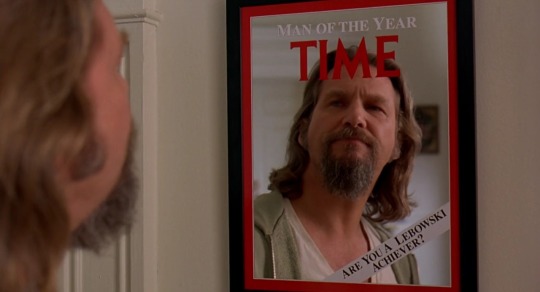
1. The Big Lebowski (1998)
Was there ever any doubt for this placement? For everything that Fargo did in terms of success within the world of the film industry, The Big Lebowski did that and more for the worlds of the counter-culture and cult film fans. The story we are presented with is so simple, yet so ridiculous in its journey, that it almost insists on viewers revisiting it over and over. Like many Coen Brothers films, nobody cast in the film is wasted or misused, and due to these stellar performances, the film finds itself as one of the most quotable in recent memory. Much like the performances of the cast, the writing does not waste any words or opportunities, often referring back to itself in extremely subtle and nuanced ways that present themselves over time, and to hilarious effect. Nobody would have expected a film of this nature to have a fandom, and yet, the legions of fans for this film are unique to that of the Coen Brothers catalog in the sense of their dedication, devotion to and love of the movie. While not everyone’s cup of tea upon first viewing, The Big Lebowski is truly an example of the gift that keeps on giving.
If the Coen Brothers never make another film, they’ve already created and achieved more in their journey that most filmmakers can dream of. Many of their films could honestly be considered works of art, and nearly all of them are compelling with an ability to leave deep and lasting impressions. If you are unfamiliar with the Coen Brothers, do yourself a favor and check out their work, as it may bring a new sense of invigoration to your love of film.
Editor’s Note (12/10/2020) : Inside Llewyn Davis added to the number 10 position, all films ranked lower adjusted accordingly.
#ChiefDoomsday#DOOMonFILM#JoelCoen#EthanCoen#CoenBrothers#BloodSimple#RaisingArizona#MillersCrossing#BartonFink#TheHudsuckerProxy#Fargo#TheBigLebowski#OBrotherWhereArtThou#TheManWhoWasntThere#IntolerableCruelty#TheLadykillers#NoCountryForOldMen#BurnAfterReading#ASeriousMan#TrueGrit#InsideLlewynDavis#HailCaesar#TheBalladOfBusterScruggs
4 notes
·
View notes
Note
Analysis of thief of light?
Thief of Light? Ooh. I’vve 8een rather lookin forwward to this one. I’m sure none of you can guess wwhy ::::p Here’s my take on Vriska Serket’s Mythological Role, the…
Title: Thief of Light
Title Breakdown: One who actively appropriates (steals, lays claim to, acquires, seeks out) Light (relevance, attention, literal light, knowledge/information, and fortune)
Role in the Session: So, the first thing that I think we ought to consider when discussing Thieves is that they’re not, by nature, greedy. Rather, they so want their Aspect because they lack it, because they believe (usually accurately) that they have been unjustly deprived of it. The reason Thieves are often bound to become greedy is that in their quest to acquire what they lack, they often don’t know when to stop, taking more and more until they realize that they had what they needed long ago. This is not the Role of a Thief; rather, this is the result of a Thief failing to step into their Role. More on that later.
The next thing we ought to consider is what it means to be deprived of Light. Light is an Aspect most commonly associated with Luck, due to Vriska Serket’s reliance on it as a tool, and the heavy-handed luck/fortune symbolism that lingers around her. However, on an ever-so-slightly-more meta level, Light is about focus and attention. Vriska, for example, grew up in a viciously oppressive society, literally and figuratively overshadowed by her cruel and demanding Lusus Naturae, an archetypal “Devouring Mother” figure that not only refused to allow her to “grow up” symbolically, but also demanded that she kill her peers in order to sustain its ongoing existence. Vriska was, to but it bluntly, out of luck, and was forced to kill or be killed, to satiate a Void that was not hers but was imposed upon her by an external force. This is but one possible way that the privation of Light could manifest – indeed, we see it manifest rather differently later in Vriska (Vriska)’s narrative arc – but it highlights the sort of desperation that pushes Thieves into their Role.
A fully realized Thief of Light is one who is able to win their luck back, get their share of the spotlight, and know when to stop. Just as all Passive Classes struggle to embrace their Aspect and direct its flow, so too do Active Classes struggle to resist the temptation to push their Aspect beyond its limits. A Thief at their best steals away things that would stand in the way of their Session’s success and repurposes them to serve the team’s interests. While a Thief can’t share what they steal, as might a Rogue, they can nonetheless use the resources they appropriate from a Session’s enemies for the common good, rather than for more selfish aims. Because they’re the only ones capable of accessing and utilizing certain resources, Thieves are often drawn to last-minute feats of heroism, providing the team the “final blow” necessary to secure their victory. A Seer of Mind could well provide the Thief of Light with the wisdom and guidance needed to use their knowledge and fortune for just purposes; likewise, a Blood player (perhaps a Knight or a Page) could act as both a line of support and a staying hand to the Thief, helping to ensure that they retain their allegiance to the team despite their Role’s tendency to try to go it alone.
Opposite Role: The Page of Void is one who equips others with, or call others to defend and serve, darkness, secrecy, silence, and oblivion. Besides the fact that those are concepts and forces that the Thief of Light is all-but-certain to despise, there’s also the fact that the Thief and the Bard have one of, if not the, widest Active-Passive disparity of any Opposed pair of Classes. The Thief of Light will likely look down on the Page as cowardly, due to Pages’ unfortunate tendency to begin the game, and to remain for a long while, incompetent when it comes to the use of their Aspect. The divide between them may grow yet sharper and more antagonistic if and when the Page of Void reaches the height of their powers, as the Thief would harbor a rather impassioned hatred towards the notion of being called to “serve Void” – such service would be terribly reminiscent of the time they spent in the absence of Light.
God Tier Powers
Light is the Actual-Associative Aspect, and as mentioned above, it is associated with such domains as attention/relevance, knowledge/information, and fortune/luck. It may also have symbolic connections to the Light of Skaia, in parallel to Void’s connections to the Furthest Ring. The Thief is the Active Appropriation Class, whose abilities center around acquiring their Aspect (usually at the expense of whoever happens to be nearby) and using it to their advantage at the most opportune moment. With these things in mind, as well as our knowledge of the beloved canon Thief of Light, Vriska “Fucking” Serket, here are a few ideas as to the powers an Ascended one might have access to…
Lights Out: The Thief of Light, to put it bluntly, knocks someone out – rendering them unconscious and thereby depriving them of their access to Light in the form of information. Note that unlike a Prince of Light, who might permanently consign a person and all they know to oblivion, the Thief of Light doesn’t destroy information but simply deprives a particular person of access to it. Indeed, a particularly adept Thief of Light might be able to assume direct control of the perceptions of someone whose Light they stole in this manner, gaining access to their direct experiences, if not their subjective memories thereof.
All the Luck (All of It): The Thief is unnaturally fortunate to a very high decree; but this fortune inevitably comes at the cost of misfortune for either the Thief’s future self, or those who travel with the Thief. Pre-Ascension, the Thief may not be aware of this ability, and therefore may inadvertently sabotage their team (or perhaps they are aware and use it nonetheless). However, if the Thief takes care of how and when they’re applying their vast surplus of luck, they can draw on their enemies’ Light rather than that of their allies, and prove themselves Heroic rather than Just.
Steal the Spotlight: The Thief would hate nothing more than to be forgotten, irrelevant, or overshadowed by another. With this ability, the Thief forces the narrative to pay attention to them, either deliberately or inadvertently weaving a complex web of Luck and Knowledge to draw events ever closer to their return to the forefront of the story. Such a return is not permanent, and may well end with a Final Death (Heroic or Just) for the Thief, but for many Thieves (of Light and otherwise), a last chance to make a meaningful move, to draw the gaze of the players and the audience alike, is worth just about any sacrifice.
Personality: The Thief of Light is bound to be dynamic, dangerous, and more than a little dramatic, attracted almost magnetically to the poles of heroism and villainy. They’re paradoxically both selfish and well-intentioned, torn between two equally strong desires: preventing others from suffering what they’ve suffered, and regaining their own lost Light (and then some). While Light is the Aspect of knowledge, I somehow doubt that a Thief of Light would be particularly scholarly; given how active the Thief Class is, I’d expect our Thief of Light to have a more hands-on approach to acquiring knowledge. Perhaps they’re explorers, illuminating new ground and staying one step ahead of their enemies, or maybe hackers, or thieves of letters or books. There are plenty of options here. In their personal relationships, the Thief is rather likely to suffer from a reputation for treachery or egotism, and it will take some effort to prove themselves trustworthy. Nonetheless, they aren’t manipulative for its own sake – their motivations, however misguided, do contain a grain of magnanimity. Whether that grain will grow to become a pearl of uhhh, (A/N: rapidly losin control of this metaphor D::::) uhm, before the Thief’s ambitions destroy them, will be the question looming over the Thief’s life and journey.
Songs ::::)
Lights Out by Mindless Self Indulgence
Summertime by My Chemical Romance
Supergenesis by the Mountain Goats
Ox Baker Triumphant by the Mountain Goats
Leave it to a Vriska kinnie to go on so long a8out the Thief of Life ::::p Anywways, I hope you enjoyed this analysis, 8ecause I sure did!! Thanks for the ask, anon!!
~ P L U R ~
#Classpect Analysis#this is a pro-vriska blog#the Mountain Goats#classpect#Thief#Light#Class#Aspect#Thief of Light#Homestuck#anon#ask
25 notes
·
View notes
Text
Jon Fox Analysis
Jon Fox is an artist from Hereford, England who specialises in fine art painting where he juggles the narrative of his work along with the pictorial composition to produce vivid mindscapes along with vivid landscapes. His inspiration is from his initial attraction to Japanese and American cartoons, comics, and computer games in addition to the hip hop and graffiti styles in which were showcased in them.

I like this because of how it gives me a bit of a throwback to my childhood as it showcases the game of Hungry Hungry Hippos in the centre and then there are ghost/spirit like figures who are playing the game, I also like how there is a white spirit/ghost in which is going around which is why there are white smoke looking textures going around which is a nice contrast to the darker areas of the image and just adds a bit of brightness along with how the further out from the centre you look the darker it gets possibly because the white sphere in the centre could be a light source illuminating what’s happening below.

This is quite interesting because of how Fox has showcased the obvious theme her of the coronavirus and I think he has showcased this very well because of how he has located his setting in a lab of some sort and has added some elements in which stand out to me in different ways, such as how there are statistics on a grid on the wall which is being drawn on by some people which would be measuring the rate of infection in a set location as well as the one which is being reflected on the floor from the 3D appearing models on the wall. Overall I just like how everything has been showcased in a way so that everything makes sense and how the colours go very well with each other as the majority of colours used are the light blue and red which obviously work well as they are both primary colours and together could be a symbol of strength and this could have been used to demonstrate the strength of the virus.
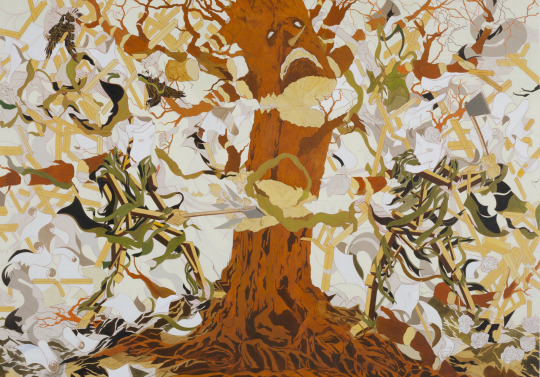
I really like this because of the overall appearance and how the majority of colours used are light in colour and not too dark and they all relate to colours relating to forestry as the main element is the tree, I also like how the facial expression of the tree matches what is happening to it because of how it is being cut down by two figures of each side of it which is slightly difficult to see but they are both holding an axe cutting the tree down and upon closer examination you can see that the floating aspects are pieces of wood in which have been cut from the tree and has been showcased in branches and planks. I have been inspired by this because of how Fox has payed attention to detail and how it helps to tell the story in the image as well as how he disguises elements within his work which isn’t immediately noticeable.

I like this because of how there is a glitch effect where the figure is in the interior of the window like frames and I think this is a great effect to use for this because of how it adds a bit more colour, I also like how there is a small grid platform above the head of the figure in which it appears to be looking up at and appears to maybe be climbing up towards it. This has inspired me because of how Fox has made a glitch effect within his work by using the inverse such as where there is red on the figure it turns blue when it is being intercepted by the frames.
1 note
·
View note
Text
Parallels between Yuki and Ugetsu and what they tell about past and future
In my earlier posts I alluded to fact that I find similarities between Yuki and Ugetsu – now I want to dig this topic more deeper to show what I exactly mean by this. After all one of reasons why I love Given so much is it how different couples foil each other at many levels. It is almost as we are presented the same struggle in different ways. This struggle is about finding balance in life - between music and love/normal life. Or if to put it in more abstract terms – between spiritual and mundane aspects. In this meta I intend to depict parallels between Ugetsu and Yuki and then use them as base to speculate on the latter’s choices. At the end I will try to predict how it can be handled in Mafuyu’s story-line in the future.
Since it is heavy topic I want to put disclaimer that I am no psychologist and I will look on this mostly how it was presented in narrative. Just keep it in mind that it is my interpretation and feel free to disagree.

Both of look here as they were in their own world, aren’t they?
Warnings: long post, spoilers and mention of suicide
Parallels between Yuki and Ugetsu are mostly indirect and tied to how they are presented in their relationships with respectively Mafuyu and Akihiko. Let’s start then from very beginning of these couples:
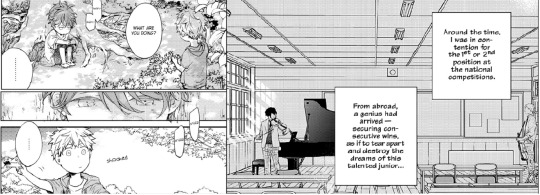
As you see both Akihiko and Mafuyu are in dark/shadow place in literal and metaphorical way. Both of them had problems with parents and were not getting enough love from them – Mafuyu had abusive father and Akihiko’s parents were neglectful and caught in their own drama. Their lives changed significantly when they met “light” (both Ugetsu and Yuki are standing in sunlight), who provided them with attention and love. Apart from it there is also motive of mutual understanding - Yuki empathized with Mafuyu because he had no father, and Ugetsu was first to recognize that Akihiko is delicate/sensitive person deep down. As trivia I want to add that these both encounters took place in summer.
No matter how they turned out later it is important that at first these relationships were positive for both parties and allowed them to find love, belonging and safety in their lives. We are shown Yuki acting very protective around Mafuyu a lot in flashbacks and it was Ugetsu who offered his house to Akihiko when the latter was homeless due to parent’s divorce. After all there is reason why both Akihiko are Mafuyu are having trouble of letting go of past and treasure these memories despite the pain.
Both pairings have strong soulmates vibes:
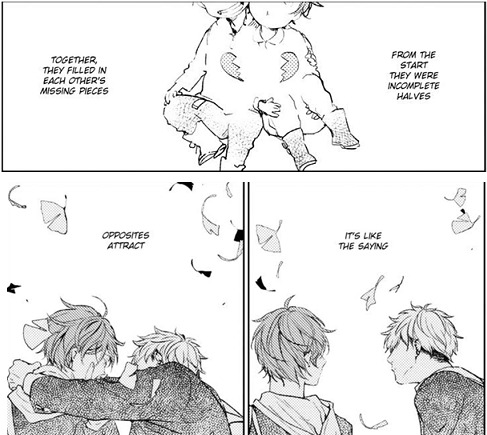
We are literally told this by Hiiragi and it is emphasized by ginkgo's leaves, which symbolize duality. In Akihiko/Ugetsu case it is shown too in a bit subtler way – they are almost always in black/dark and light/white clothes (something that anime picked up too) and in color illustrations are often used red and blue/green, which are complementary according to color theory. And stands count as well – Yataragasu (symbol for sun) and squirrel (symbol for earth).
By opposites we should take into consideration not only personality traits, but what I mentioned at start – mundane and spiritual (music) aspects. In other Kizu Natsuki’s original works there is similar pattern in couples too – where one person has more down-to-earth attitude and second one is more thinking of ideas in abstract terms. I like how this was put in words in blurb from “Yukimura-sensei to Kei-kun” – as providing spiritual nourishment to another person.
Both Yuki and Ugetsu’s talents are called in similar terms – something special and otherworldly. Unfortunately, this had not only inspirational but negative effect too– Akihiko abandoned his dreams and I assume that Mafuyu probably too felt overwhelmed since he waited for Yuki’s initiative to work together on music instead of actively asking about it.
Both Mafuyu and Akihiko are making strong association between love and instruments played respectively by Yuki and Ugetsu – as if guitar and violin was symbolically token of love. Just think how Akihiko compared explicitly his love to Ugetsu to love for playing violin in chapter 27. In addition to holding guitar all time in beginning Mafuyu’s songs are thematically connected to Yuki – first about pain of losing him and second about acceptance of his death and moving forward. It is a bit fascinating how music can be both positive and destructive. Thanks to music Akihiko and Ugetsu got to understand each other, but it also effected in split when it wasn’t balanced in life like in Mafuyu and Yuki’s case. It is a bit alike a Force in Star Wars.
And just like in Star Wars – without balance everything falls apart:

Though Akihiko is talking about Ugetsu and Mafuyu here, I think the same applied to Yuki. We know that after going to high school Yuki went to job to buy guitar. It was highlighted that it was expensive model, so he must spent a lot of time working to obtain it. And don’t forget that in his house single mother was only source of income, so he probably helped in paying fees and things like that too. To sum it all up he spent considerable amount of time on job to buy guitar and then later probably even more in studio playing – his life was basically dedicated to music at this point, no wonder that Mafuyu felt out place and strain appeared in their relationship.
And I think I don’t have to point out examples about Ugetsu spending really most of his time on music? Even though he got talent, he is practicing really hard to be at the highest level.
So let’s move from music to normal life.
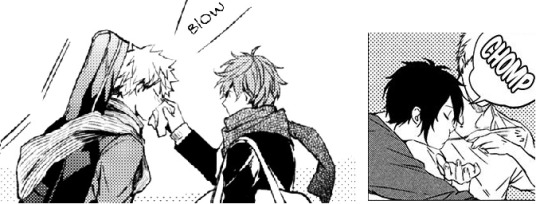
It has similar vibe, doesn’t it?
Since both Ugetsu and Yuki are very immersed in music their basic needs are taken care by respectively Akihiko and Mafuyu. We have multiple instances in story where Akihiko is worried about Ugetsu’s well-being (like eating properly and so on). With Yuki there is only that one occasion, but I won’t be surprised if there will be more if we get more flashbacks.
Of course remember that both aspect are equally important and it very important to have them covered in life. According to Maslow’s Hierarchy of Needs we must find every one of the elements needed to seek fulfillment and change through personal growth.
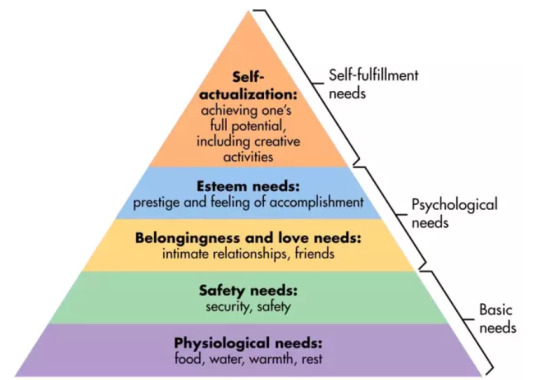
And as you see love is very important too – we see in Given what happens when it is missing – apathy (Mafuyu), self-neglect (Ugetsu) and losing sense of living (Akihiko).
So we have parallels covered. I think that they clearly intentional and can be used as some kind of base to figure out more about Yuki and his mindset and choices. But firstly let’s take closer look on Yuki chapter 11.5
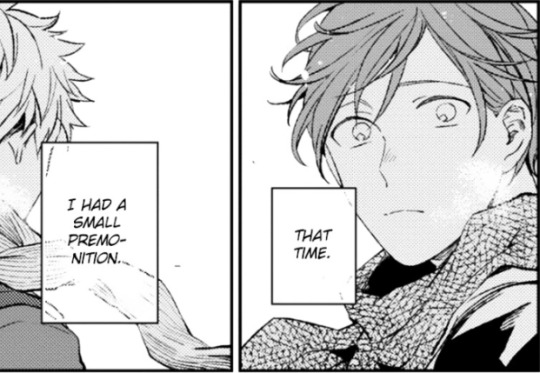
Judging on clothes – winter ones – it seems that it took place shortly before their argument. Even though they are together there is this vibe of being distant from each other. It is bit hard to put into word feeling of this scene, but it seems like some form of goodbye from Yuki like he wanted to make more memories so Mafuyu wouldn’t forget him easily. There is clear implication that he was feeling lonely. It may be a bit of over-interpretation, but I consider it interesting that Yuki got most of piercing in high school – after spending most of his time apart from Mafuyu. In some way it can be interpreted as sign of internal pain, since Akihiko got his piercing after first breakup with Ugetsu. I think it is safe to assume that Yuki felt depressed due to loneliness and separation from Mafuyu – losing his balance in life and music could not sustain him.
Before moving to their argument, firstly let’s take closer look on reasons why Ugetsu broke up with Akihiko. Because it is not simple as love for music was just more important for him.

This decision can be examined on three levels:
Identity / afraid of change – Ugetsu’s home is such great metaphor for him – ascetic, isolated from rest of world and dedicated solely to playing music. To me it feel like he thinks that music should be his priority because he has nothing except for it and it is only thing he is good at. So he thinks that he has to put music as first, because he is nothing without it and nobody would give him attention if he doesn’t play at the highest level. Accepting his feeling to Akihiko as equally important would mean that he has to change the way his was living and identity he build for himself.
Self-guilt –he blames himself for Akihiko abandoning his dream about playing violin as pro.
Loneliness – he has no friends and his family doesn’t seems to be supportive or take active role in his life either.
I want to highlight that it was bad decision, which caused only more pain for them both. Deciding arbitrarily what is good for another person and breaking up without telling reasons is bad. It is even underlined in narrative – Ugetsu thinks of himself as coward and lowest of low. Mafuyu thinks of this as wrong too (and again another parallel):
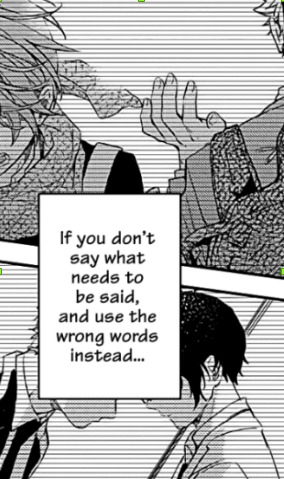
But saying “right words” would be talking about his insecurities to Akihiko, showing vulnerable side and stopping to run from his feelings – Ugetsu was not ready for this and took “easier” path to stop suffering by pushing away Akihiko. To me it looks as he wanted to turn back to state before knowing him, but obviously it didn’t work since love changes people and shutting out feelings is not something easy.
So keep all above in mind and now let’s take look on argument between Mafuyu and Yuki:

Identity / afraid of change – even though Mafuyu stressing out that music is tearing them apart, Yuki didn’t acknowledge this and simply want Mafuyu to trust him. It all sounds that Mafuyu felt betrayed, but is seems that Yuki didn’t want to change his attitude towards spending so much time on music and acknowledge this as something wrong – so I think that music is as much important to him as to Ugetsu.
Self-guilt – during this argument Yuki had learned how much this is causing hurt, so I am assuming he too thinks that “his existence fundamentally means suffering” for Mafuyu. Like you know thinking that Mafuyu words “Would you die for me then?” meant that Mafuyu would be better or happier without him.
Loneliness – despite having friends and supportive mother Yuki is pretty alone in this – it doesn’t looks that he tried to get help or talking with them. Even though Hiiragi was just observant Yuki didn’t try to talk with him. Just look below –from the way Yuki patted Hiiragi’s arm it looks to me as Yuki tried to pretend that everything was okay.

Unlike Ugetsu he can’t turn back literally before knowing Mafuyu since they meet as kids, so this is out of option. So he decided wrongly that there is another way to permanently “end suffering” for both of them. I want to repeat what I stated earlier – it is just my interpretation and maybe something else affected him too. But looking at major themes of story – how different characters has dilemma between music and life/love I expect Yuki’s story be something similar like that. I hope too that I sounded too judgmental – I am aware from my personal experiences that changing and fixing flaws is not that easy and sometimes reaching for help from others takes a lot of courage too.
God, it was hard to write I got so emotional. Okay I recovered so moving out to:
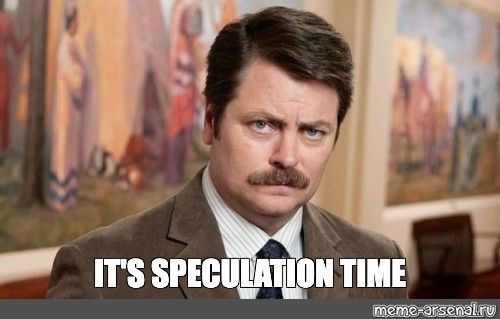
Just to make things clear – I don’t think that Ugetsu is going to die or something like that. Parallels are often used to emphasize differences in the end. I think that he is going to make amends and seek forgiveness for hurt he caused from Akihiko. His story resembles how redemption arc are usually done, but this is big topic for another time. I firmly believe that he will get happy ending, especially since Akihiko is very forgiving.
Since Yuki isn’t protagonist we will see rest of his story through Mafuyu’s eyes. I think there are two ways:
As mentioned before Mafuyu wanted to write song together with Yuki. I suspect that this wish will be fulfilled in different way. In recent chapter Hiiragi wanted to work on some Yuki’s song together with Ritsuka. Again because Yuki was special when it comes to music I don’t think it would be easy task. It is possible that we would get to see them all together working on this as some kind of collaboration between these two bands. Who knows, maybe even we get to see Mafuyu singing it. The tone and lyrics of this song would give us new information on Yuki too. And it would be interesting to know if this song was meant by him to be gift for Mafuyu. Besides, since Mafuyu seeks often Ugetsu’s advise on music I think he will be involved too. Honesty I think that just writing new song for Given by Mafuyu could feel a bit repetitive, so this way could make things more interesting.
Some alongside this way I anticipate that Mafuyu would open up more and talk about his bottled feelings about Yuki. Probably first to Ugetsu, with whom Mafuyu feels understanding and thus mirroring chapter, where Ugetsu talked about his relationship with Akihiko. Then later with Ritsuka. To be honest I feel like waiting for this so long. Main reason why I want this to happened – I think it would be good for Mafuyu to express it all during normal conversation (not just through music like before) to make final peace with past. And to solve Ritsuka’s issues with jealousy for good. I would also love to see Mafuyu introducing Ritsuka to Yuki’s mom and/or inviting her to LIVE performance.
Secondly, I think that near end of the story we will get dream sequence with Mafuyu and Yuki. To show their final goodbye, which they didn’t have chance to do in real life. It would signify that finally Mafuyu had forgiven himself and Yuki, made peace with past and is ready to embrace wholeheartedly present and future with Ritsuka. Kizu Natsuki pulled out similar thing in her other work “Links” so I think it is quite possible. After all subtitle of Given is - “I cannot say goodbye I am still drifting in your echoes” - I think that showing their final goodbye like this would wrap story really nicely. Because in the end the core themes of story are healing, forgiveness and finding love.
So it is all for today - thanks for reading. To end it on bit lighter tone I will borrow Bob Ross’s words:
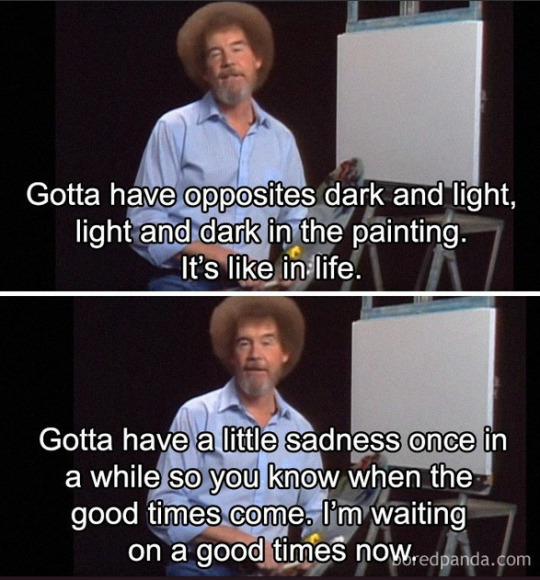
#given#given meta#given manga#given anime#mafuyu satou#satou mafuyu#yuki yoshida#yoshida yuki#yuuki yoshida#murata ugetsu#ugetsu murata#akihiko kaji#kaji akihiko#given spoilers
92 notes
·
View notes
Text
the angry prince of goofs
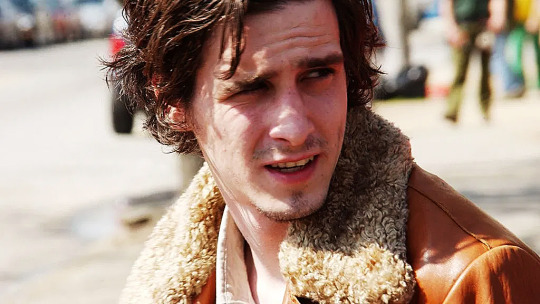
I’ve been thinking about Ziggy Sobotka, which was probably my first mistake, and especially about one little detail that’s demonstrated repeatedly but not really explored in depth: Ziggy is good with technology.
Better than most of the characters in his orbit, at any rate; he understands computers, understands the internet, has to explain digital cameras and search engines to Nick, who still seems confused. And while, even for 2003, I wouldn’t claim he’s a technical genius, this detail stands out to me partly because it’s one area in which he’s expressly shown to be more capable than his cousin — typically the far more competent of the pair — and partly because he tends to get written off, both in-universe and out, as, well... an idiot. A stupid guy who does stupid things simply because he’s stupid, with no greater character depth or complexity than that.
And that... kinda irks me! Look, I get why Ziggy’s not exactly a fan favorite. He’s not cool. He’s not a badass. He’s immature and abrasive and makes a lot of frustrating decisions, and I get why so many viewers find that annoying, I really do. But although he can certainly be a dumbass, I’m honestly not convinced that he’s dumb, and I think it does a disservice to the writing of the season and to James Ransone’s performance (easily among his best work, imo, out of the roles I’ve seen him in) to boil Zig down to just a clueless annoyance with no regard for why he acts the way he does or his value to the overall narrative.
So I’ve been thinking about Ziggy Sobotka, and types of intelligence, and finding one’s place in the world, and how Ziggy’s character arc relates to The Wire’s overarching theme of a changing city at the dawn of the new millennium.
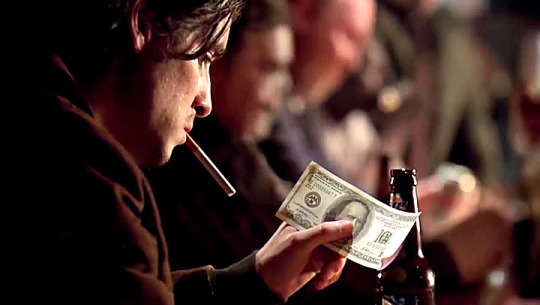
Twice, over the course of the season, Ziggy’s mentioned in connection with college.
The first time is in 2.06, as Frank chews him out about literally burning money at the bar — definitely one of those moments that baffles and enrages viewers, cause oh my GOD, Zig, Nick goes to all that trouble for you, and then you burn a hundred dollar bill? What the heck, man. But I love this scene with Frank. It’s Ziggy at his most subdued and collected; it’s one of maybe two substantial conversations between father and son all season; and it reveals that Ziggy is capable of being far more observant than he often seems. Frank, frustrated with the lack of employment available for Ziggy, vents, “Maybe if I’d have listened to your mother, cause she’s the one always talking about you should do the community college, like your brother.” Why would Frank let one son continue his education, but not the other? Well, I have to read between the lines here, but I don’t think it’s outlandish to guess that it’s because Ziggy is — or was supposed to be — Frank’s heir. We know he’s Frank’s firstborn, and we know that for Frank, working on the docks is more than an occupation; it’s a cherished family legacy going back generations and a huge point of pride. Ziggy was probably always earmarked to follow in his father’s footsteps, and he probably always knew it. “You wanna know what I remember?” he says, and describes the education he did receive: a life spent paying careful attention to his father’s world. “Everything. Everything.” College just was not a necessary part of the life planned for him.
But there’s absolutely no future on the docks for Ziggy, and by this point, father and son both know it. It’s a rapidly dying profession with scarce shifts available for L-series juniors, so maybe it’s no surprise Zig puts a lot more effort into being a thief and drug dealer than he does into being a checker. Unfortunately, despite seeming fairly adept in logical-mathematical intelligence (technical knowledge, facts/figures, coming up with plans), Ziggy fumbles in all these pursuits because of one type of intelligence that he definitely does lack: interpersonal/social skills — i.e., the ability to read a room and to play well with others. He constantly annoys people, never realizes he’s being tricked until it’s too late, and lets emotion get the better of him, leading him to be irresponsible and impulsive and seek instant gratification. This is, again, in contrast to Nick, who is much less tech savvy than Zig but far more personable and reliable. People like Nick. They trust Nick. Even Frank seems to have a closer relationship with his nephew than with his own son.
And this feeds into a critical difference between Nick and Ziggy. Nick, with Aimee and Ashley to support, is primarily motivated by a need for money; Ziggy, on the other hand, cares less and less about money as the season progresses and is primarily motivated by a desire for something Nick already has: respect. More broadly, Zig craves the validation of others, whether that validation comes to him as respect or approval or even just attention. This, more than immaturity and definitely more than a simple lack of intelligence, is what drives his behavior, including his most reckless or seemingly inexplicable acts. In some circumstances, it inspires him to act like a tough guy; in others, it manifests in childish clownery like whipping out Pretty Boy or waltzing around with a seeing-eye duck, as though he were a comedian playing to a crowd. It’s why he wastes his money on showy status symbols, like Princess and a $2,000 coat, or on buying rounds for the bar. And of course, it manifests in trying to show up his father, who seems to have plenty of time and money for all the other stevedores and yet, by his own admission, pays scant attention to his own son except when Zig screws up... which, needless to say, Zig has a bit of a chip on his shoulder about.
The irony, of course, is that the harder Ziggy tries to impress people, the less it works. His attempts to act tough get him trounced. The other stevedores are happy to let him buy drinks and play class clown, but they are very much laughing at him rather than with him, and the same guys who egg him on and flatter him always turn right around and scoff at what a fool he is after it blows up in his face. His biggest attempt to prove himself is the car heist... which actually goes off without a hitch! Like I said, Zig’s not bad at logistical planning; he comes up with a clever scheme and carries it out successfully. It should’ve been a triumph for him — proving that he could handle himself, that he didn’t need Nick or Frank looking out for him and deserved to be treated like a valid player in the game. But Glekas, like everyone else, saw Ziggy as easy to take advantage of and too weak to effectively retaliate. If it were earlier in the season, he’d have been right, just like every other time Zig wound up tricked and humiliated. Unfortunately for everyone involved, though, by that point, Ziggy — impulsive, hotblooded Ziggy — was “tired of being the punchline to every joke.”
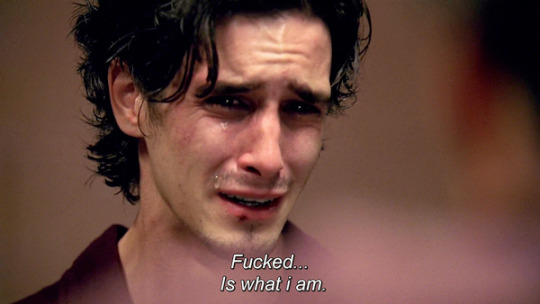
The Wire: Truth Be Told (which I haven’t gotten to read beyond previews) calls Ziggy the “angry prince of goofs.” I think that, more than anything, Ziggy is someone who keeps trying on different costumes and never finds one that fits. He was supposed to carry on the Sobotka stevedore legacy, but the profession is dying, and even if it weren’t, Nick is far more an heir apparent to Frank than Ziggy is. So he tries to be a tough guy, but isn’t; tries to be the sort of cool, funny guy people like and admire, but can’t; tries to prove himself as a player, but makes mistake after mistake until he screws up so horribly that there’s no coming back from it. When Frank tells him that what he did to Glekas and the store clerk isn’t him, Ziggy replies incredulously, “It ain’t?” — because it is him, he did that! But he’s not suited to being a killer, either; he immediately falls apart with horror and remorse. So what is he? Who is he? Was there anything he could have succeeded at, any way he could’ve made better choices than he did?
In 2.10, shortly after Ziggy’s arrest, we meet Priscilla Katlow — the same girl listed on the fake paternity papers Zig gets pranked with in 2.07. In the earlier episode, Nick implies that Prissy is, to be crass, kind of the neighborhood bicycle, making it sound like she was nothing more to Zig than a one-night stand. I have a lot of feelings about the fact that it turns out she’s actually a childhood friend who’s visibly in tears over Ziggy’s situation when she finds Nick grieving on the playground of their old school. They’re maybe the only two characters we see who seem to not only care about Ziggy but genuinely like him, and they reminisce about a time, years ago, when he was supposed to buy them all some SoCo and Pikesville Rye. Instead, he bought Boone’s Farm — because, he claimed, “that’s what the college kids drank.” Then, while drinking it on that same playground, he shouted, “College kids ain’t shit!” And I know I’m really galaxy-braining here, really reading a lot into just a few lines, but I can’t help but wonder, like… This seems to have taken place toward the end of high school, since Prissy was driving her mom’s car and Ziggy could pull off a fake ID. Ziggy probably already knew that he was bound for the docks right after graduation, if he wasn’t working there already; Frank wasn’t even entertaining Zig’s mother’s wish that they send him to college instead. And I wonder if, to some extent, Zig resented that? Or resented not having a choice? Because this anecdote implies a mixture of wanting to emulate those college kids (drinking what he thinks they drink) while simultaneously deriding them — perhaps because he knew that he couldn’t be one, no matter whether or not he wanted to, and therefore had to act like the entire concept was beneath him.
I don’t know whether Zig would’ve done better in college anyway. I think that, contrary to popular opinion, he did have his own areas of intelligence and competence, but despite being in some ways the more “book smart” of the Sobotka cousins (Ziggy’s technical knowledge vs. Nick’s common sense), maybe he’d have been too immature to put in the work for school, too lazy or too proud to try. But I just wonder if he might’ve had a better chance at life that way, both in terms of staying out of trouble and of possibly finding a field that would’ve better rewarded his skill-set. Insofar as The Wire in general is about the changing face of Baltimore and how the shifting infrastructure of the city impacts the individuals within it (particularly the economically marginalized), and insofar as season 2 specifically is about the death of American industry and of the traditional blue-collar working class, Ziggy is an exploration of someone who fell through the cracks of that shift and, in that respect, was sort of doomed to failure from the beginning. James Ransone has described him as “very castrated” in terms of his power and potential for social mobility, the game being rigged against working-class people like him even with the advantages of being a white male. Ziggy’s brother, armed with a college education, might fare better in the 21st-century workforce... But even if Zig hadn’t ended up in prison, he probably wouldn’t have lasted much longer in the family business anyway. Johnny Fifty, a more senior checker, is homeless by season 5, and unemployment is the implied fate of nearly all longshoremen in the near future.
And honestly? Although I really like Ziggy, I appreciate that he’s a failure. I think one of the reasons I do feel so deeply for him is that the narrative never rewards his errors or glorifies his misdeeds. If it did, he’d risk coming off as one of those edgy, disenfranchised white guy antihero types, and I doubt I’d have found that nearly as sympathetic or interesting. By the standards of The Wire, Zig’s relatively small-time in terms of how much damage he causes and pretty notable for how extremely he regrets what harm he does do, but that still doesn’t excuse his actions, and the narrative doesn’t pretend that it should. Nor does it pretend that he’s not also worthy of our interest and pathos anyway.
Ziggy Sobotka is not cool. He’s not a badass. He’s not any of the things he tried to be during the season, and he’ll probably never get a chance, now, to be anything other than a murderer locked up for life. And I know he wasn’t entitled to any fate other than the one he earned for himself, but I wish he’d been able to find a better path.
#the wire#ziggy sobotka#james ransone#nick sobotka#frank sobotka#y'all i have written some ''there is absolutely no audience for this'' posts in my day... but this one takes the cake lmao#which is a shame tbh cause i'm proud of it!!! my particular brand of overzealous character analysis at its finest#meta#my meta#op
68 notes
·
View notes
Text
Scene Analysis: “Deliver Us”
originally posted in 2016 [x]. requested by somehow-you-will.
Childhood memory is a major theme in The Prince of Egypt. Rameses is haunted by his father’s legacy and abusive words; he’s motivated by his fear of being the weak link in the chain. Moses is able to whistle and recognize the lullaby he heard when he was just an infant. Indeed, the day that Yocheved surrenders Moses remains with Miriam and Aaron, too, impacting them in very personal, and unique, ways. Yocheved’s memory is preserved, her role centralized, both in her children’s ability to recall these early events and in her song, which forms a motif.
It makes sense, then, that Yocheved is the first of the family we see, and hear. The movie introduces her, and as she passes in front of the camera, her dress sweeps across like a curtain to reveal Miriam and Aaron. Finally, she unwraps Moses from the veil in which she has been desperately hiding him.
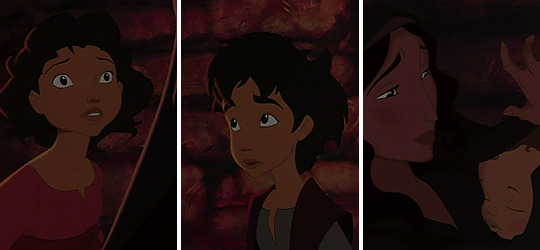
Right away, we’re able to identify this beautiful person as a mother: It is she who ushers her children — our protagonists — into the story. A symbolic birth, which occurs in the order of their birth. I think this is significant, for age also affects what they are able to understand and remember about the day.
Miriam is first, and in her close-up she follows her mother’s movements with a quiet, focused expression. In fact, attentive is a word that describes the entire family; certainly in this scene, but throughout the film as well.
Even as a child, Miriam’s vision seems clear and her devotion strong; though at this point, she is observing Yocheved’s lead, awaiting her mother’s signals. The “River Lullaby,” with all its prophetic power, has not yet been passed to her. Already, though, she’s concerned for her baby brother and cognizant of the violence around them — perceptive, also, of the terrible whys and the gravity of their situation. The way she stares after the Egyptian guards, and looks over her shoulder at the place they’ve fled, double Yocheved’s actions. As much as these two are reacting in worry and fear to the events, they are doing whatever they can to act upon them.

When I watch this part of the movie, I’m struck by how well “Deliver Us” constructs Miriam’s understanding and her role in both the story and her family. As the sibling who watches over Moses as he’s carried on the Nile and embraced by his adoptive mother, she becomes the only one who can tell him about his history. This full experience also supports her sense of optimism and faith; hope is grounded in her memory. So, she is very much a mother-figure to her two brothers: their source of information, comfort, and a firm but gentle love.
At the same time, the prologue sets up the obstacle in Miriam’s story. She has the most complete memory, but what she doesn’t know, and does not expect, is that Moses was never told about his origins. I think this point of shock and disappointment is key, and it’s why I view the scene by the well as an important deconstruction of all three siblings’ childhood memories.
Meanwhile, Aaron’s attentiveness is characterized differently. In the very first frame, he’s shown gazing after his mother, a question silently forming in his eyes. The way he quickly turns towards Miriam also speaks to the kind of relationship they have, and will maintain. Throughout “Deliver Us,” Aaron’s expressions and body language betray a sense of insecurity, which I feel is partly due to his age. He might be able to obey his mother’s cues, but unlike Miriam, he can’t fully grasp the situation, and his memory is confused, particularly traumatic, as a result.
This vulnerable position is reinforced by the physical contact Aaron keeps with his mother; for instance, he stays by her, and later appears to reach for her hand as they near the river. Similarly, there are a number of times where Yocheved lays her hand on his head or at his back. At one point, while they’re still rushing through Goshen, Aaron’s feet carry him a bit too far ahead of his family, and Yocheved pulls him back before he can be seen by the guards. Her instinct to protect her second-youngest child shines here (she also checks to make sure Miriam is with them before they all set off again). For the rest of the sequence, it seems like Aaron trails behind Yocheved and Miriam. I’m not sure if this was a conscious choice made by the animators.
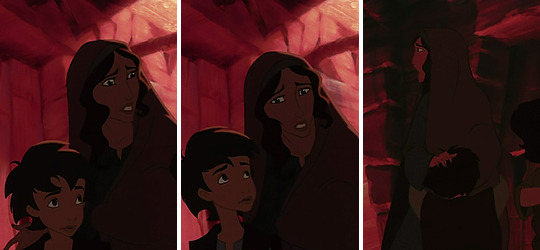
[He’s honestly the cutest, though. And his hair just kind of sticks up all over the place?]
It’s interesting to me that Aaron’s closeness with their mother is not captured in Moses’ hieroglyphics dream. Instead, Miriam is holding Yocheved’s hand the entire time. I like that this shows Moses’ perspective — linking the two women — as well as how subjective dreams can be.
The opening of the film pays special attention to Miriam’s reactions and expressions. This is critical on a narrative level because she is a central character; as viewers, we need to be able to read her, and understand her connection to Moses. By contrast, there are more shots of the back of Aaron’s head and fewer direct angles on his face, which tend to obscure our understanding of how this experience is affecting him. However, it’s really his body language here, along with his general inclination towards skepticism later, that provide the insight we need. The day is a cruel one, and because he gains no concrete confirmation of Moses’ survival, Aaron’s memory affords little more than chaos and uncertainty. His reaction upon meeting his brother by the well follows suit with what he can — and cannot — remember and trust.
The difference in focus between Miriam and Aaron also reflects their own dynamic. She’s the older sibling, and even as children in this scene, she leads (her perspective is more visible) while he follows (his more hidden). Miriam is the answer to Aaron’s questions. The certainty to his doubt, in a thematic and personal sense. There is a moment at the riverbank where Aaron takes Miriam’s hand, and she tugs him forward. I wonder if he’s holding her hand to reassure her as much as he is seeking comfort for himself. Or, if he’s (quietly) asking her to move closer. Regardless, it’s a sweet little interaction that unfolds naturally…
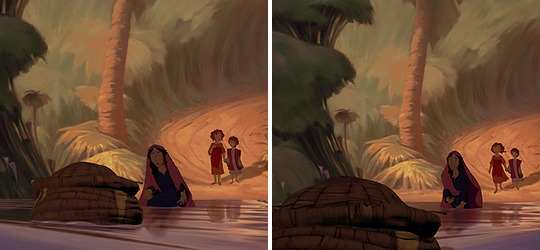
I love how “Deliver Us” is able to establish their bond through visual, rather than verbal, means. Aaron grows up to be so protective of Miriam, yet he will always be her younger brother, one who has faith in her. There’s a balance — a constancy and mutual reliance — to their relationship. They look out for one another, and I think this is clear from the start.
In this analysis, I don’t mean to ignore or downplay the devastating loss happening in this scene. Many families, including this one, are being torn apart, destroyed. According to the art book for The Prince of Egypt, the creators took great care in emphasizing childhood memories*. Even having Moses carry with him a subconscious memory of the “River Lullaby” feels right, authentic. An affirmation, perhaps, of his lost blood ties. He and his siblings have different recollections of this painful day, and what I believe “Deliver Us” really accomplishes is laying out, wordlessly**, and for all of them, their connections to the past, to each other, and to their mother.
* The Prince of Egypt: A New Vision in Animation by Charles Solomon, p. 36
** Spoken dialogue-lessly :)
Last edited: 9/26/16
#the prince of egypt#miriam#aaron#light of my life#hope is hard to kill#yocheved#my stuff#my writing#*#another personal fave analysis#maybe i'll remove the cut later
106 notes
·
View notes
Text
How to Handle Blocking in Your Story

Hopefully by now you know that in most of your scenes you need to have a character in a setting with tension, but there is an area of writing where I don't feel like we spend enough time talking about, which is blocking. And I'm not talking about writer's block.
The term "blocking" is borrowed from play performances. Blocking is just about anything an actor does that isn't dialogue: where they stand, where they look, how they interact with the setting, how they move across the stage, how close they are to what, how they interact with props. Often audiences pay little attention to blocking, or rather they don't think about it enough to appreciate it.
But if a play has little to no blocking, well, that's a tough play to sit through as an audience. They may not always have an eye for great blocking, but they'll notice if it's not there.
Blocking is just as important in fiction writing. And like with plays, it's likely the reader won't appreciate great blocking, but they'll get antsy and annoyed if there is no blocking, and they'll get confused if there is poor blocking.
If you don't use blocking, not only does it make it difficult for the audience to imagine where your characters are relative to the setting, but you're selling your story short by not using it to your advantage.
As an editor, I see blocking problems crop up from time to time, usually in dialogue scenes. The writer will tell me where the characters are (for example, cooking in the kitchen), but then as I read the scene, I get no sense of specifically where each character is in the room, what each one is doing, if they are standing at an island or sitting at the table, chopping lettuce for a salad, or loading the dish washer. Next thing I know, not only are they done cooking, but they are done eating and are outside getting in the suburban.
Sure, some scenes don't require much, if any, blocking. But in most scenes, you need some sense of blocking.
Likewise, you can over-block a scene--putting so much blocking in, that it becomes unnecessary, sucks up the scene's focus, and slows the pacing.
A great narrative hand knows how much to guide the reader and when to back off.
So let's get to some tips about blocking:
Watch out for:
- Continuity Errors. One of the main problems I see with blocking in unpublished fiction is continuity errors. In one line, a character is sitting on a couch in the living room, and a few lines later, she's sitting on her bed, in the same scene with no sense of motion. Often it can happen with objects characters are holding. Misty is knitting a scarf, but then a few lines later, it says she's knitting a blanket. It can happen with food. Zack has a cup of orange juice, but later it talks about how he's enjoying the taste of coffee.
Watch out for when characters' hands are full or when you have them doing something they aren't capable of. For example, say it's been recently established that Sandra glued back together two broken figurines and she's holding one each hand. While she's waiting for them to dry, she doesn't dare put them down , and then suddenly she's buttoning up the jacket of her little boy. What happened to the figurines?
In some cases, motions can be assumed--but make sure they can be, or that you imply them somehow, so that it doesn't read like a continuity error.
Watch out for having characters sit down, who were already sitting, or characters standing up who were already standing. Characters who put on their shoes twice, or turn off the fan twice.

- Spatial Vagueness. I'm trying to decide if I see this one more than continuity errors . . . and I have to say probably. Another one of the most common problems with blocking, is vagueness. This usually happens because the setting, objects, or characters' distances from one another or other things haven't been properly established. I might get a line that says, "Joey walked down the street"--and as the scene goes on, I get no sense of what street, what city, what it looks like, what season it is, or where or why he is walking in the first place. Sometimes I don't get any sense of setting and only conversations and body language, and next I know, I read the line "Tiff walked inside." What? They were outside that whole conversation? And what did she walk into?
When blocking is vague, the audience has to fill in the blanks, which can be a problem if it's not what the author actually pictures. As an editor, this often happens to me. I'll be picturing the characters sitting in opposite places in a living room, and then suddenly I'm reading how one put her arm around the other. In my head, they weren't close enough to each other to do that.
Use:
- Specificity. Being specific isn't necessarily the same as being detailed. Details can help make something be specific, but they aren't the same thing. And with blocking, in some cases, the more detailed it is, the more it hurts the story because it slows the pacing and changes the story's focus. In my example above, "Joey walked down the street," the sentence can be more specific by adding and changing a few words. "Joey walked down Mulberry Street, autumn leaves crunching under his feet."
In certain kinds of action scenes, it can be very important to be specific in word choice, and not in details. "Joey leapt for the fire escape." "Margaret hit Lolly in the jaw." But if you try to put too much detail into action, it can slow the moment way down.
In some cases, it's helpful to establish the setting before the characters start interacting with it. This makes the setting or "stage" more specific in the reader's mind. They know there is a pool table and pinball machine in the room, so when one character slams the other into the pool table, it makes sense. Be specific, not vague. How much detail you include depends on pacing and the focus of the scene.
- Blocking to contribute to or emphasize points. This is especially true for conversations. As an argument gets more intense, a character may invade the other's personal space. If one character suddenly says something that makes the other uncomfortable, the latter may take a step back. If one character is vulnerable, whether the second draws closer or steps away can convey a lot.
Of course, you can use setting and props to do the same thing. As an argument gets intense, one character throws something at the other. If someone is uncomfortable, she might put something (an island, a couch, a car, a teeter-totter) between them. If she's feeling vulnerable, she might "hide" or "block" herself by getting a blanket, picking up a book to look at, or turning away from the speaker to pretend interest in a rose bush.
When Sherlock gets frustrated, what does he do? He stabs the mantle. He puts a bullet in the wall.
This is blocking that emphasizes and contributes to the situation or point at hand.
Even in a scene where blocking is the primary focus (building an invention, competing in America Ninja Warrior, forging a sword, hunting), how the character interacts with the setting and objects can emphasize points--how tightly he holds a screwdriver, how sweaty her hands are against a climbing wall, the way he beats the metal, how many shots she shoots.
You can also use blocking to heighten tension. "He picked up a knife and concealed it under the table," immediately adds tension and anticipation to a scene.

- Blocking to Convey Character. Similar, yet different from, the last section, you can use blocking to convey character, rather than just the moment at hand. The fact that Sherlock stabs the mantle whenever he gets frustrated is something specific to his character. It helps establish who he is. And actually, that fact becomes specifically important in season four--when we understand that he, someone who is supposedly not driven by emotion, sometimes manifests more raw emotion than any one else.
A character who sees litter at a park and picks it up is much different than one who adds to it. A character who comforts a crying stranger is different than one who ignores them. A character who always makes sure she's near an exit is different than one who could care less. Blocking is great to show character and their feelings, rather than tell them.
- Blocking to give motion to still or stagnant scenes. You may sometimes have scenes where all that really matters is the conversation between two of your characters, or maybe you need to have your character delve into a moment of introspection to solve a mystery. It might not matter even where this moment takes place. A lot of beginning writers will open a story with a character sitting and thinking. One of the reasons this is a problem is because there is no motion, there is nothing happening in the present moment.
Use blocking to add motion. Instead of having your character sit and think, maybe you can have her catching insects for her bug collection while she thinks. Not only does this create more motion and interest, but also gives you material for the two bullet points before this one, so that it can actually add to the introspection and characterization. The fact she just caught a monarch butterfly might not be important to the main plot, but it tells us more about her, and in fact, you can even use that event and butterfly as a type or symbol of whatever she's thinking about for added emphasis and tone.
With that said, some conversations are very important, interesting, have high tension, or natural draws--they may have incorporeal motion--and already carry the audience, and sometimes when you put in blocking, it actually takes away from that, instead of contributing to it, by drawing away the audience's attention. Their attention to the conversation is competing with the blocking. So watch for that.
- Blocking for natural pauses, lulls in conversations, and for beats in dialogue. On the topic of dialogue exchanges, when there is a natural pause in dialogue or a lull in conversation, instead of saying "There was a moment of quiet," you can put in a bit of blocking to convey that.
"Forget it," Fred said. "I didn't want your help anyway."
Nancy looked down at the scarf she was crocheting and realized her hands had stopped moving. She put the scarf down on the coffee table, and flattened it out as she tried to find her words.
"You like her, don't you?" she asked.
You can also use blocking for beats in dialogue. Rather than always using dialogue tags, you can use a beat to imply who is speaking what line.
"Cedric Diggory was murdered," Harry said.
"Whatever you've been told," Professor Umbridge said, "that. Is. A. Lie."
Harry shot up out of his desk. "It's not a lie!"
Bonus
Watch this short scene between Umbridge and McGonagall for a good example of how blocking conveys character, emphasizes points, adds motion to the scene, and how it's weaved in with dialogue. In addition to the two professors, notice the blocking in regards to the students and what it conveys.
Intermediate Tip:
Try to have your blocking accomplish more than one thing.
Maybe it can hike up tension and convey character.
Maybe it can emphasize a point and help us follow a fight scene.
Maybe it can replace a dialogue tag and convey something important about the setting.
And remember, in some scenes blocking is more important than in other scenes.
If you would like to learn more about blocking, Writing Excuses has a podcast episode on it.
#writing#writer#writing tip#writing tips#writing tips and tricks#writing help#writing helps#writing lesson#writing lessons#writing advice#writing a novel#blocking#author#editor#writing reference#writing references#writing a book#nanowrimo#sherlock#harry potter#fanfic#fanfiction
4K notes
·
View notes
Text
ALL IS SUBTEXT - A Case for Jon and Sansa (part 5)
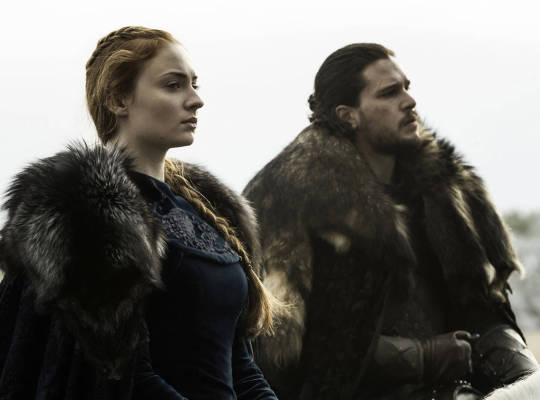
This is the fifth installment in my analysis of the romantic subtext in the scenes between Jon and Sansa in seasons 6 and 7 of Game of Thrones (Part 1, Part 2, Part 3, Part 4). I’ve examined the different techniques that the show employs to create this subtext through primarily visual means. This post is is a direct continuation of part 3 and part 4 where I began examining the romantic tropes that inform the scenes between their. Once again I’ve had to break up my analysis because there are so many tropes in play and I am trying to be meticulous in my analysis. So here is yet another very long post.
KNOW YOUR TROPES
The ambiguous romantic subtext in the scenes between Jon and Sansa exists almost entirely on the level of the visual - and that means that we have to pay close attention to non-verbal cues, costume design, image composition and editing.
I have previously mentioned that tropes are excellent tools when it comes to creating subtext because they function as a narrative shorthand. They rely on audience familiarity and genre conventions, which mean that there’s no need to spell things out - and subtext exists at the level of the unspoken.
So without further ado, let’s have a look as some more JonSa scenes where romantic tropes are in play.
Gentle readers, gird your loins - this post is hella long.
Declaration of Protection. This trope occurs when the hero’s motivation is built around protecting another person. This is usually the love interest but it can also pertain to other kinds of relationships (as well as larger entities such as a home or the realm as per Jon’s season 7 arc).
Both seasons 6 and 7 make it clear that Sansa is the hidden reason for many of Jon’s actions. She’s the one that gives him the will to live and fight again. She shakes him out of his depression and disillusionment after he’s been resurrected - and he is determined to protect her at any cost. The night before the Battle of the Bastards, Jon issues a solemn declaration of protection when Sansa states that she’ll never let Ramsay take her alive, hinting that she’ll kill herself if Jon loses the battle.
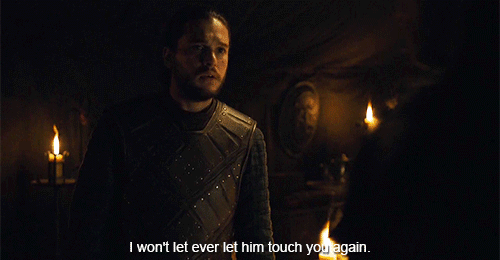

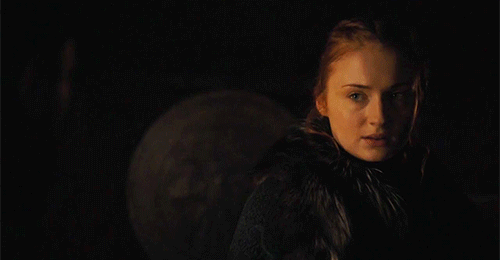
(GIFs by https://giffferrplanet.wordpress.com/2016/06/23/game-of-thrones-the-night-before-the-battle/)
Sansa’s reaction is heartbreaking. No one has be able to protect her since her father died and her scepticism in the face of Jon’s promise is understandable yet so very sad. However, the thing to notice here is Jon’s sad puppy-dog face when Sansa leaves - now it isn’t just Winterfell that hangs in the balance, Sansa’s very life rests on his shoulders as well.
Battle Couple. This trope pertains to a couple who are partners in combat:
This is the kind of couple where bullets figure prominently in the story of their romance. Where “war buddy” and “significant other” are synonyms. If you harm either one of them, the survivor will kill you as surely as the sun rises. (TVTropes)
Jon and Sansa may not fight side-by-side in the physical sense but Sansa’s presence at the parley with Ramsay (as well as her involvement with raising troops, etc) puts them into the territory of Battle Couple. Furthermore, the visuals repeatedly puts them side-by-side to emphasize them as a team.
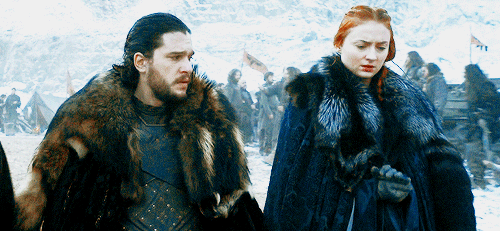
The parley with Ramsay offers a number of shots that presents Jon and Sansa as a united front.
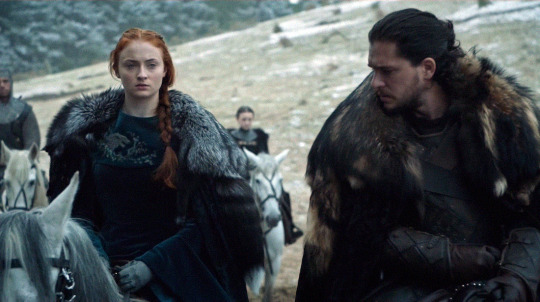
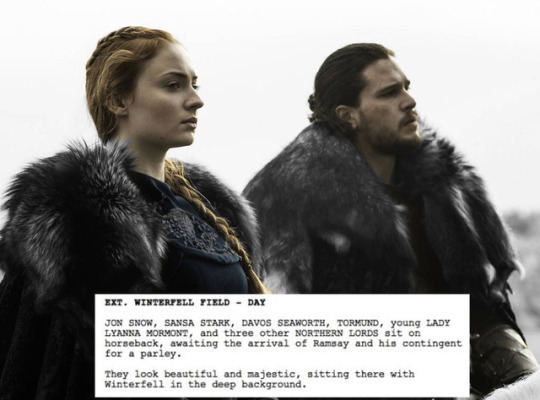
In short, they look “beautiful and majestic” together (as the script explicitly states).
Ruling Couple. This trope is generally used in relation to a monarchial setting:
A ruling couple, on the other hand, are equal or near equal partners, and may even be Happily Married. Rather then one ruling and one staying in the palace they jointly rule. The rulers will rely on each other as trusted counselors and they will be The Good King and The High Queen in one. Perhaps they will show this by receiving audiences on two thrones. Perhaps the consort will have a regular seat in the royal council and a vote. Perhaps even the two of them will discuss deep and labyrinthine affairs of state during matrimonial activities.
On many occasions, they will also be a Battle Couple. (TVTropes)
Jon and Sansa may not be a Ruling Couple in the traditional sense (not yet anyway). However, the visuals repeatedly show them sitting side-by-side, looking regal, when they interact with their bannermen.
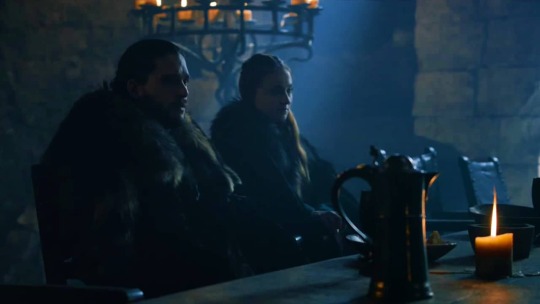
The shot below is an especially strong visual because it offers a simple yet effective image composition. Jon and Sansa are placed firmly in the centre of the shot, framed by the large hearth that forms a pale background against which and they stand out visually. They are further framed by the black silhouette of the bannermen. This, along with the slow zoom in, serve to highlight them visually in a way that ruling couples often are presented. Once again, Jon and Sansa look beautiful and majestic together.
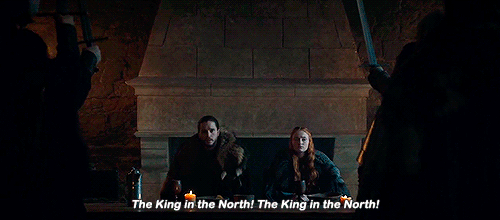
This shot is not only visually striking but it may very well be narratively significant as a piece of subtle foreshadowing. The kingmaking scene follows the most narratively important reveal in the entire show: the revelation of Jon’s true parentage as the son of Lyanna Stark and Rhaegar Targaryen. Immediately after this revelation, Jon is chosen as King in the North based on his status as Ned Stark’s bastard son and he’s thus elected under false pretenses even though he is unaware of his true parentage.
Placing the parentage reveal before the kingmaking is an interesting (and very deliberate) editing choice because it introduces the possibility that Jon’s parentage may become a problem for his kingship in the future. Jon’s true parentage relates to several popular tropes: Really Royalty Reveal, Hidden Back-up Prince, Secret Legacy - or as I like to call it: the Hidden Prince. When a narrative employs this trope, the truth will ALWAYS come out and it is always be of extreme narrative importance. While Jon relinquished his kingship in season 7, his status as a leader in the North may very well be further imperilled when the truth comes out. There’s been written several metas on how a marriage between Jon and Sansa would effectively unite the competing claims to North and unite House Stark firmly under Jon’s leadership, so I won’t go further into this argument here.
Rather, I’d just point out that by placing the parentage reveal right before a scene that invokes a visual iconography of a ruling couple in such a strong image composition, the show simultaneously teases the likelihood of a future conflict as well as its possible solution - in one single image!
When Jon is declared King in the North, despite Sansa having the heriditary claim to Winterfell, he turns to Sansa to gauge her reaction. he wants her to approval before he accepts the kingship - and she smilingly approves without uttering a single word. Yet another instance of them being in accord.

It is a move that is similar to this interaction between King Leonidas of Sparta and his queen Gorgo in 300 (2007) - spouses in accord, there’s no need for words.

Whilst Sansa isn’t Jon’s formal co-ruler, the show continues to seat her next to Jon when he exerts his authority as king. This is especially important since Winterfell’s Great Hall lacks the visual stage-setting of power that characterizes the Red Keep and Dragonstone. Jon’s “throne” is just a regular chair and he is placed on the same level as his subjects - yet he maintains a certain distance by standing behind a separate table at the end of the room, right in front of the visual centre provided by the hearth. The table acts as a physical and visual barrier between him and his bannermen so even though he’s not physically elevated above his vassals, he does inhabit a space that is sectioned off from them (though he quickly moves beyond it). Sansa inhabits this same space, right by his side!
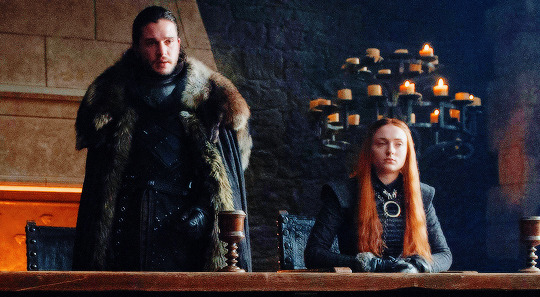
However, Davos also sits next to Jon, at the same side of the table. Here it is important to pay attention to the image composition! As you can see, Davos is seated a bit farther from Jon than Sansa - and this slight separation is visually emphasized by the hearth where the light reflected on the lower mantel creates a visual barrier between Jon and Davos. No such barrier exist between Jon and Sansa - and the slightly skewed perspective also makes them look closer to each other. In short, though three persons are seated side by side, Jon and Sansa are grouped together in a visually distinct manner that evokes the iconography of a Ruling Couple.
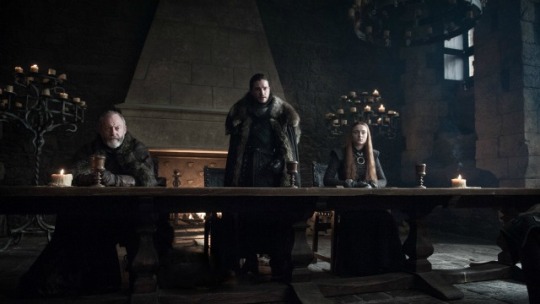
Even their costumes support this trope! @jonsalways has penned an amazing costume meta that about Jon and Sansa’s costumes in seasons 6 and 7. She notes that the colours and the overall silhouettes of their costumes match each other, which not only makes them look good together but also serve to underscore them as a team. I’m going to quote her here because she cuts to the heart of the matter in such a succinct manner:
When you look at the items they wear (it) is also wonderful. They both have a cloak, a cape, a dress/shirt, a “metal necklace”, a collar over the necklace and a belt. Every single detail in Jon’s costume has a equivalent on Sansa’s. It’s almost as they wear the female and male version of the same outfit.
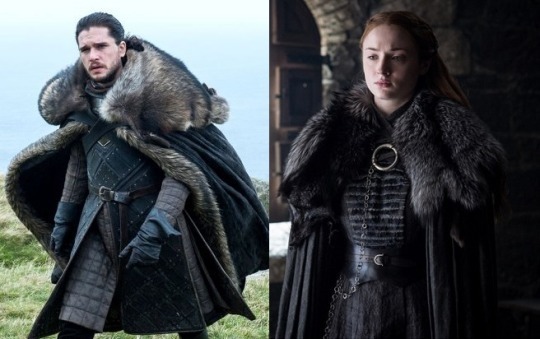
When they are side by side, they look beautiful because their costumes match in pieces and their silhouette look just right. It’s comfortable to look at them because they look so similar. It’s almost like you don’t see two characters wearing two different concepts. You see them together as one whole concept. If they could switch their cloaks/capes, the colors would work just fine. And they are the only Starks whose costumes do that. Michele Clapton does it for a reason.
The elements mentioned in the quotes work on the level of the visual sub-conscious, i.e. we simply notice that they look aesthetically pleasing together but it is seldom something that the general audience give much thought to.
However, there are obvious symbolic elements to their costumes that we are most definitely are meant to notice; elements that also work as statements about their characters and their narrative journeys. In the case of Jon and Sansa, the symbolic element is the Stark direwolf, the heraldic sigil of their House - and this element tells the story of two characters travelling towards the same destination in season 6 and on parallel lines in season 7.
In season 6, we see Sansa visually reclaim her identity as a Stark through an act of (literal) self-fashioning: she makes a beautiful dress where the bodice acts as the canvas for the presentation of the Stark direwolf, made with materials that probably are supposed to evoke the natural landscape of the North - such a irregularly cut squares of mother-of-pearl (that made me remember the wonderful mussel shell necklace that Karsi wore in season 5).
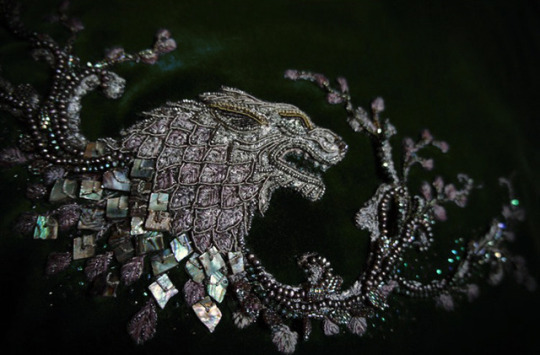
Sansa’s homemade dress is a profound act of self-reclamation. She emblazons her chest with the ancestral symbol of her family - almost as an answer to the way the Lannisters put their heraldic stamp on her neck in season 3:
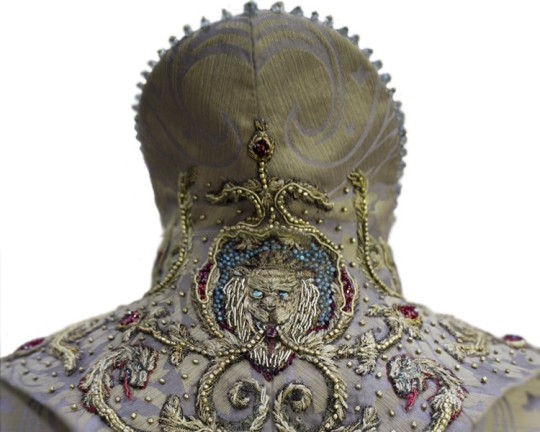
Throughout the season she’s repeatedly insulted as being no Stark - Lord Glover tells her House Stark is dead and Lady Mormont snidely calls her both a Lannister and a Bolton. Sansa answers that she will always be a Stark - and it is written on her body for all to see.
Jon is also wearing a single direwolf on his costume to match Sansa. However, his symbol is much more discrete in form and placement - probably both for reasons practical and symbolic. Sansa is the trueborn Stark after all. Jon’s cloak is a gift from Sansa, she made it herself - and the show actually takes the time to show us this:
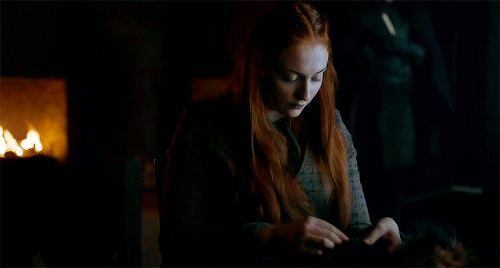
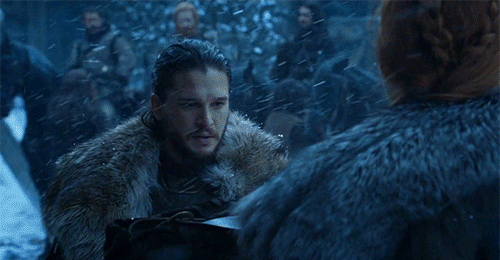
We don’t see Sansa make the dress that is so important to her identity - but we get to witness her make a garment for Jon that is invested with a profound emotional, symbolic and political value. When Sansa gifts Jon with a cloak stamped with the Stark direwolf she wordlessly acknowledges and claims him as a Stark for all the world to see - the very thing that always has been Jon’s greatest wish! It is really very beautiful - she’s the one that makes a matching pair out of them (since she probably also made her own Stark fur).
Politically, Jon’s new cloak is also significant - not just because of the Stark sigil but also because it is just like the one Eddard Stark wore! The patriarch whom the North once were sworn to, for whom they went to war! It is a politically savy move because Sansa Stark understands that clothing isn’t just about covering your body, it is also a language.
(the two edits below are by @baelerion)
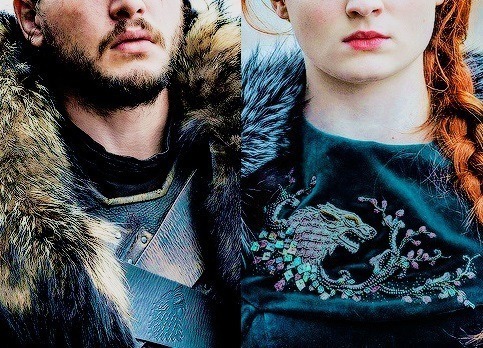
Season 7 builds on this symbolic aspect of Jon and Sansa’s costumes. Now they both wear a pair of direwolves facing each other. Notice how they wear the Stark sigil on the same part of their bodies in both seasons - on the chest and then at the neck! Once again they match.
The double direwolves are interesting because, unlike season 6, their stories have moved beyond becoming Starks (again). Now their narrative journey is about their partnership and that is signalled by the double direwolves. They have to learn to act in tandem. While they have their differences and instances of miscommunication, season 7 is about them acting as a ruling team, as King in the North and Lady of Winterfell - two titles that originally belonged to just one person. Once again they are being posited as two halves of a whole - the ruling pair of the North, which is formalized when Jon names Sansa his regent before he travels south.
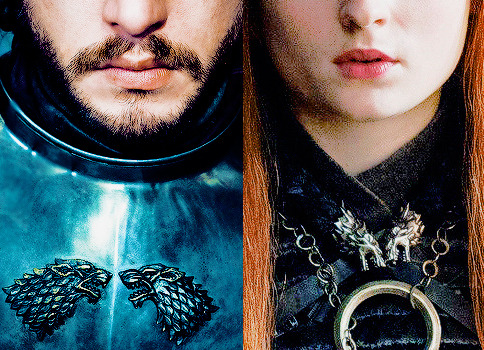
Interestingly enough, Jon and Sansa’s double direwolves have their echoes in two earlier costumes. When Bran acted as Robb’s regent in season 2, he wore a gorget just like Jon’s - and when Robb attended the Red Wedding as KitN he wore a pair of direwolf clasps just like Sansa’s! Now the costumes are reversed, the gorget for the KitN and the clasps for his regent. An interesting detail that very likely is significant, considering Michele Clapton’s symbolic and narrative approach to the costumes of GoT.
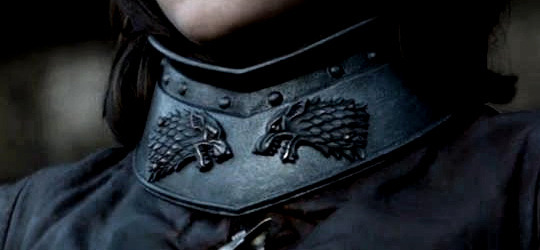
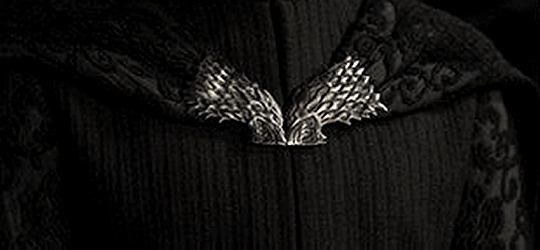
Even down to the smallest detail, the costume design presents Jon and Sansa to the audience looking like a ruling couple; a couple that are on parallel narrative journeys. It is also worth noting that it is only Jon and Sansa who wear the Stark sigil in season 7! Neither Arya nor Bran appear to wear the Stark direwolf even after they’ve returned home to Winterfell. Perhaps that is because it is Jon and Sansa who are the leaders of House Stark and the North.
I’m going to return to the issue of image composition in relation to the Ruling Couple trope. When season 6 aired, HBO released this wonderful and very memorable photo. (I’ve reversed it for visual variety)
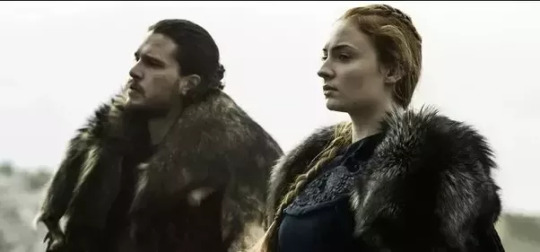
This beautiful image doesn’t actually match what we see on out TV screens! This is a still photograph, taken by a separate photographer (a unit still photographer). Not only do we not see this exact pose in the episode in question but it is also clear that this image has been through a graphics editor since the bluish tint from the episode has been removed in favour of a stronger visual contrast with the background so Jon and Sansa’s figures capture the eye immediately.
Still photographs like this are created specifically for publicity and marketing. This image became very popular with the media outlets that cover the show - not surprisingly since it is one of the most visually arresting images among the promotional material released to the press. This image became a very popular header picture in several reviews, think pieces and post-season articles, such as this one in TIME where a possible Jonsa marriage is discussed.
I hesitate to name this photo “iconic” because I think it is too early to use that designation. It is, however, an extremely striking image with the clear-cut profiles, the matching costumes and the sharp silhouettes against the light background - there’s no visual “clutter” to distract the eye from the regal couple. Jon and Sansa really stand out against the background and everything from the direction of their gazes to their matching colours and silhouettes tie them together visually as a couple. They look like a king and queen in this image and since it was a popular choice with the media outlets, it is an image that has repeatedly been presented to the people who follow the coverage of the show online. That kind of image repetition can also work to plant the idea of Jon and Sansa as a couple on the subconscious level.
This image is pretty much the incarnation of the line from the script about Jon and Sansa looking “beautiful and majestic”. They look like a King and Queen, there’s no need for crowns here.
No other couple has looked as regal as these two in the entire show!
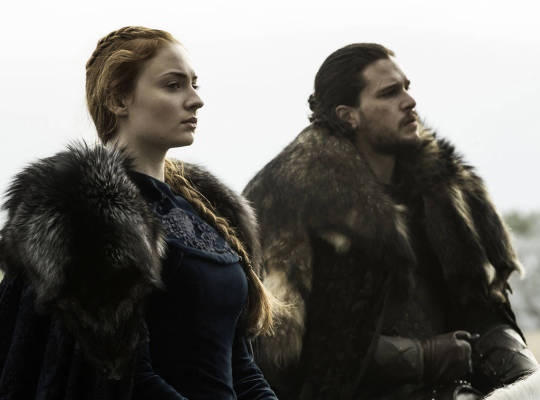
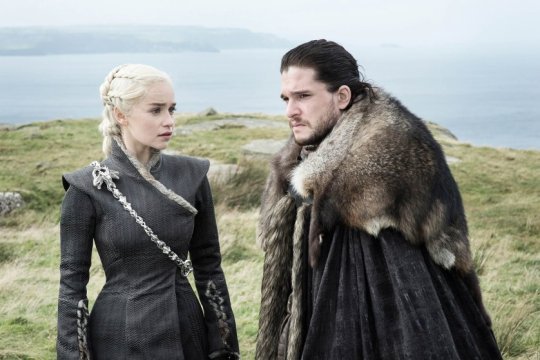
In contrast, one of the most popular stills of Jon and Dany from season 7 is markedly different. @jonsalways has noted how Jon and Dany’s costumes never truly match, neither in colour nor in silhouette. That also is very apparent in this image. What is even more interesting is the fact that this composition doesn’t convey harmony and togetherness like the regal image above, which makes sense since Jon and Dany isn’t one the same page in this season. Not only do they have conflicting interests and goals, the one is also intent on subjugating the other. In short, they don’t look like a romantic couple.
In terms of body language Jon and Dany are completely out of sync and there’s a distinct lack of communication between them. Whilst Dany is gazing at Jon, her body turned towards him, Jon’s attention is elsewhere. He faces away from her and doesn’t even seem to acknowledge her presence. When compared with the JonSa image above, the background almost feels visually “cluttered”, which also means that it is much less attention-grabbing than the first image. When it comes to drawing visual attention to something, less is generally more.
As said, the regal image of Jon and Sansa doesn’t appear in the show itself. The closest the show matches the promotional image is this double profile shot:

This shot is of particular interest in relation to the Ruling Couple trope because the image composition adhere to a common iconographic schema for portraits of royal couples.
Fx in this coin minted for the 70th wedding anniversary of Queen Elizabeth II and Prince Philip.

Or this design for a stamp featuring Crown Prince Frederik and Crown Princess Mary of Denmark. These are but a few example from a vast number of offical royal portraits.

Throughout seasons 6 and 7, the show presents the audience with a large number of visuals that depict Jon and Sansa in a manner that is associated with ruling couples.
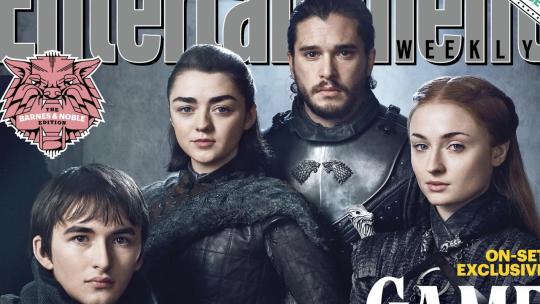
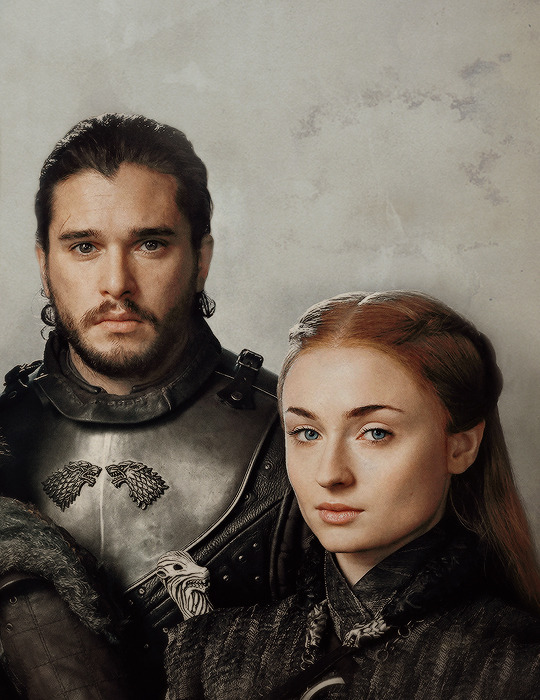
Interestingly enough, the Stark-centric cover of Entertainment Weekly in 2017 positively screams Northern Royal Family! This is of course a group portrait of a group of siblings (even though Jon is actually their cousin). However, not only is Sansa placed next to Jon (instead of fx between Bran and Arya), the combination of a standing male and a seated female evokes a time-honoured compositional template for official royal portraits. I’ve included a couple of examples for comparison.
Crown Princess Victoria and Prince Daniel of Sweden.
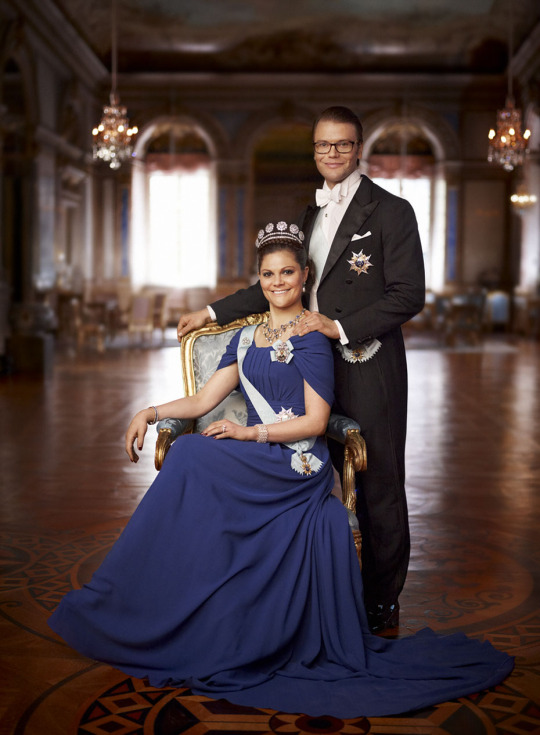
King Frederik IX and Queen Ingrid of Denmark.
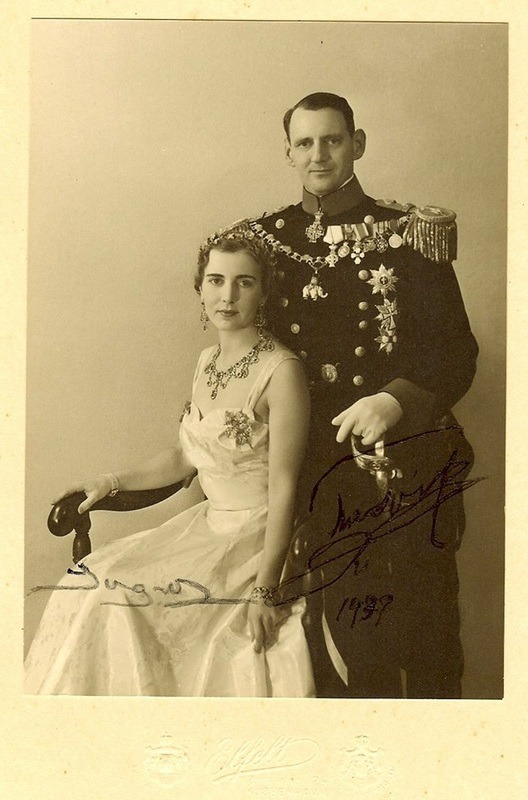
Then there’s this lovely portrait of Crown Prince Frederik and Crown Princess Mary of Denmark.
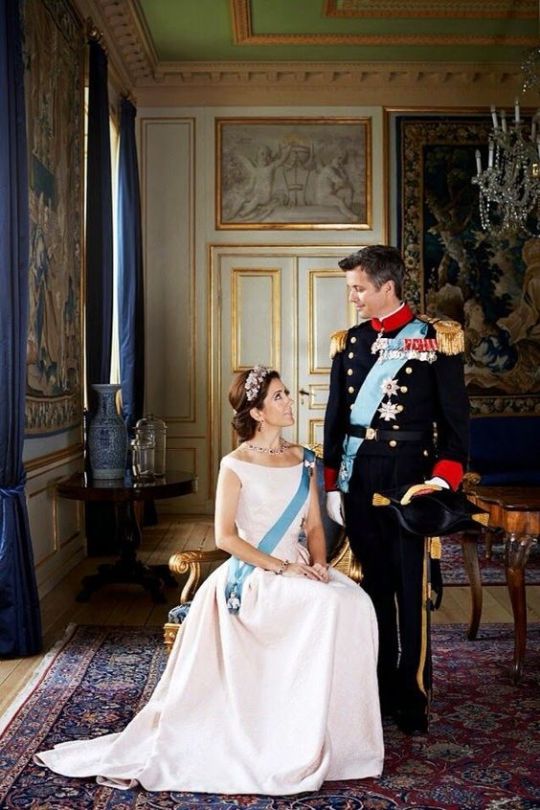
This is a slightly different variation on the pose but it is also a popular one in royal portraiture. Notice how we also have a very similar image of Jon and Sansa in the last episode of season 6?
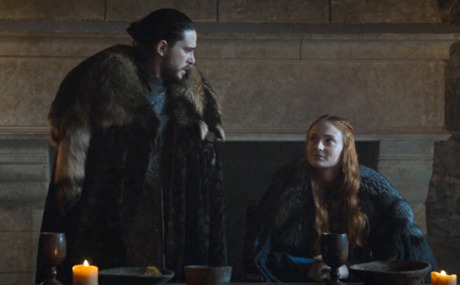
It is unclear whether the cinematographer consciously chose to model these shots of Jon and Sansa on popular visual conventions for royal portraiture. It is entirely possible that these similarities are coincidental to a certain degree. By that I mean that when we see a lot of pictures, certain types of composition becomes so familiar to us that we don’t register them consciously. However, I do think that the similarities between the image composition in the shots where Jon and Sansa are placed side-by-side are the result of some conscious choices, especially since directors and cinematographers often turn to art for inspiration (like Dan Sackheim took inspiration from Caravaggio’s art for Jon’s resurrection scene).
To be continued...
(GIFs and edits not mine)
260 notes
·
View notes
Text
Winter 2018 Anime Overview: Devilman Crybaby and The Ancient Magus Bride
(the weird symbols in place of punctuation will go away if you click on read more. sorry I cannot fix them).
It’s that time of the season! Time to look back on the anime I watched over the Winter 2018 season and give my thoughts on them. We’ve got at least five anime to get through here. l start out with the two that gave me the most conflicted feelings.
Devilman Crybaby

Devilman Crybaby is a 10-episode anime adaptation of Go Nagai’s 70s manga Devilman, revamped for a modern audience. It was released all at once on Netflix. The story follows a young man named Akira Fudo, a Nice Young Man (tm). His childhood friend Ryo gets him involved in hunting demons and he ends up merging with one! He becomes Devilman, a demon who retains his good human heart. With Ryo at his side, he vows to use his powers for justice and fight the bad demons.
I...watched this for some reason, and I pretty much already did a review (beware spoilers) and covered my thoughts on it in my liveblog. I didn’t come out exactly a fan of the show overall, but it was an interesting experience at least. I had a fun time looking into the weird history of the franchise and with all the memes. Devilman Crybaby is based on a old, influential manga and there’s a good breakdown of some of the smart adaptation choices the series made here. Probably the thing that a lot of people in my circle talking about it the most is it’s EXTREMELY queer, and while the representation is a mixed bag to say the least, it makes an effort.
Overvall, there’s some cool concepts and arcs in this series, such as the the depictions of Satan and God.There’s also some neat animation and aesthetics, but plotwise it’s uneven with the first half being very weak in the pacing department and the characters were not explored as much as I’d like.
There’s also a lot of badly handled and salaciously framed sexual assault junk as well as gross, exploitative framing of women’s bodies while mens’ bodies are largely left alone. The tired way it deals with sexuality is really boring and standard when you get down to it, rather than “shocking” like it tries to be.
What i really got out of it was I will keep the doomed queer lady couple and carry them in my heart along with the other gay stuff and I will laugh at how Extra Ryo is forever, but in the long run, not much else is memorable and will stick with me.
The Ancient Magus Bride (Episodes 14-22)
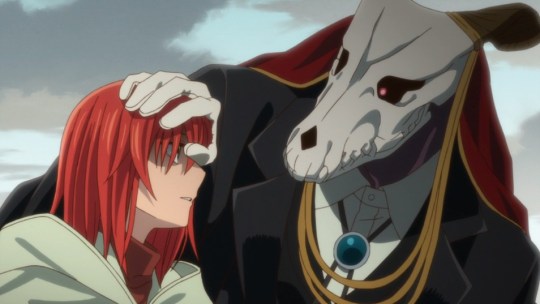
Read my review of the first half of the Ancient Magus Bride here!
Hoo boy. There is a lot to unpack with this one. I am going to get pretty detailed with my analysis here, so major spoilers. The TLDR version is: good stuff with Chise’s mom, bad ending episode, read the manga.
Let’s start with the good. We see Chise grow a lot as a character during this second half of the series and there’s a really nice focus on her forming friendships with girls closer to her age. The series shows her building a life outside Elias for herself and she becomes more self-possessed. She and Elias have a lot to teach each other, and they have some refreshingly honest conversations.
The series also doesn’t shy away from depicting Chise’s trauma and shows her grappling with it a lot.. She still places a very low value on herself and feels guilty for relying on others, and Elias calls her out on that. She’s taking steps forward, slowly. Episode 22, probably the strongest episode of the series, deals with the issues she has with her mother and her backstory and there are a ton of cool things there
Chise’s mother attracted monsters in a way similar to Chise does, and when her husband abandoned her, she struggled to both support and protect herself and Chise. It was near impossible task considering all the things trying to kill them and her desperation eventually led to a complete breakdown, where she tried to strangle Chise and lessen her burden. When she snapped out of it, she was so horrified at what she’d done, she committed suicide.
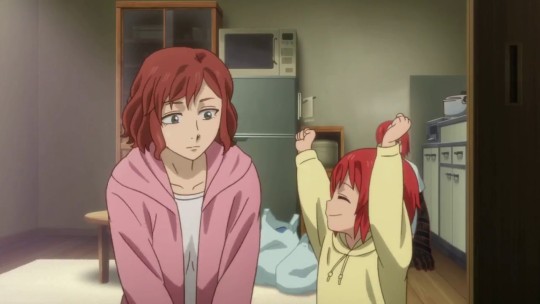
Chise takes a deep dive into her memories and comes to the realization the “mother” that has haunted her all this time was a version of her mother she herself constructed in her head based on her mother’s worst moment, a mother who wants her dead. But her mother didn’t actually want that in the end, otherwise she wouldn’t have let go of Chise or hated herself for what she did. Her mother, like any human, was not just one emotion or one moment, she was a fragile and flawed person who really did care for Chise before she broke down. Chise recognizes that now.
But, and this is the key, and what really made this episode work for me: Chise explicitly does not forgive her mother. Her mother is complex and more than just that one act, but that doesn’t mean that one act can be overlooked, or is any less scarring for Chise. She crossed a line that cannot be uncrossed, and Chise doesn’t have to forgive that to move on. Her mother abandoned her and now she has a new life. She chooses not to let her mothers actions define her.

I really enjoyed that. It’s true the images we construct in our heads are different from the real people we interact with, who are more complex, and the way this episode explores that is cool. One important moment can define the version of that person we keep in our hearts. And this episodes message that you can recognize someone who abused you as a complex and even pitiful person and still not forgive them. The most important thing is to move forward. A lot of stories wouldn’t have handled this sequence that deftly. The narrative sympathizes with Chise’s mother, but it doesn’t excuse her and neither does Chise herself.
But hey, speaking of abuse and narratives glossing over it! Let’s talk about Elias.

So you know all those female friendships Chise’s having and how she’s like, getting a life outside Elias? Elias is not okay with that. In fact, he’s SO possessiv he threatens Chise’s life at one point- she has to threaten to hurt herself to get him to stop squeezing her. It’s pointed out that Elias is like a child, which is true enough- he’s very new to feelings and interacting with people. But the excuse “oh it’s because he’s like a child” is eerily reminiscent of how abusers are excused in real life- “he can’t control himself, he’s just throwing tantrums”. Abusers are often babied in this way.
The idea Chise is obligated to “mother” him and teach him basic morality and self control even at risk to herself is a dangerous one. Nobody should be expected to do that, much less a traumatized teen. Yet Chise instantly forgives Elias for nearly killing her, when she clearly needs to get out of this relationship before she is harmed more, because this behavior can only worsen.
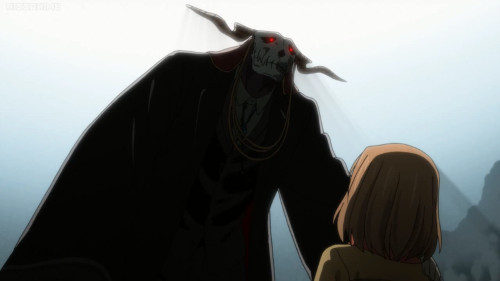
And I actually don’t have a problem with this for most of the narrative- because it’s not romanticized It is clearly a mistake that Chise indulges Elias’s behavior because, realistically, it escalates.
Chise’s days are numbered thanks to a curse and he promises Chise he’ll work with her to solve the problem. But he goes back on his word and tries to sacrifice another human to save Chise. He even goes so far as to make Chise faint to keep her from interfering, utterly denying her agency. And the kicker is he chooses to kill the a little girl Chise has befriended for this, explicitly because he’s jealous that Chise “looks at her” differently that she does him. He is literally so possessive he’s willing to kill children Chise dares pay any attention to.
it’s unbelievably fucked up, and the narrative treats it as such. It also make it clear this is the natural result of how toxic this relationship has gotten. Chise arrives in time to stop Elias and her sheer horror and rage is very powerfully done. For the first time, she sees him for how selfish and dangerous he is, how much he doesn’t respect her wishes and their relationship is broken. In a powerful (and satisfying) moment, she slugs him in the face.

Then she leaves him, stating “I can’t be with you as you are now.” Her rage and pain is the central focus here. And I have no problem with the narrative- it depicts an abusive relationship without endorsing it. It shows how these things can escalate, and it shows that Chise has very much outgrown Elias.
There’s a good scene shortly after where the fey tell Elias to take Chise back by force, as is their fairy way, and he says no, he needs to try to understand how humans work and change how he does things. That’s some really interesting stuff- the supernatural beings have their own entirely different way of approaching "love”, and Elias was entrenched in that. But now he has to learn how to love in a more honest, less possessive way, like a human is supposed to. That would be a really interesting journey to see- I love contrasting morality systems between various magical beings.
So, It’s no longer a good idea for Chise and Elias to be near each other. Chise needs her space from him and Elias needs to seriously change and make amends.
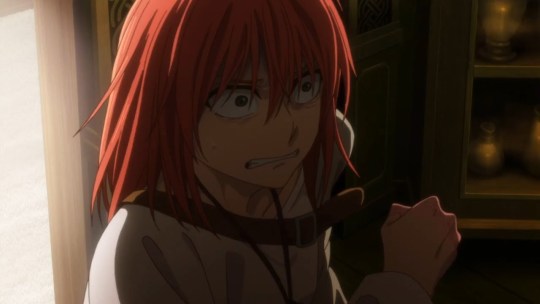
I fully expected this to be how the anime ends. With Elias and Chise seperating and the promise that they will both be able to grow and change and learn to be without each other. And probably a hint that they’d reunite eventually, when Elias has truly changed (not just SAID he will). It seemed to be the natural arc of the narrative and honestly what these two characters NEEDED to really progress.
But the anime said “fuck character development, fuck healthy relationships, fuck pacing, fuck everything” and threw the arc it had been carefully building out the window.
In an extremely rushed and jarring final epsiode, Chise does a dangerous thing and asks for Elias’s help and he complies and...thus she instantly forgives him. Despite the whole thing being treated as a huge deal, suddenly this very real issue of their toxic relationship is forgotten, she goes back to him and their disagreement is treated as nothing more than a cute spat (with Elias claiming Chise is equally at fault because she acted on her own without waiting for him once, proving he has learned NOTHING and does not understand the severity of what he did and how it is in no way equivalent to Chise simply being reckless), they even turn chibi.
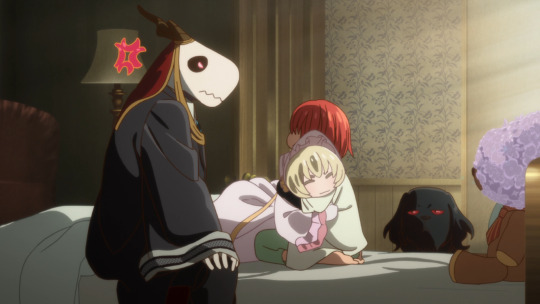
THIS IS AN ARGUMENT OVER HOW ELIAS TRIED TO MURDER A CHILD CHISE LIKED OUT OF PETTY JEALOUSY. IT’S A BIG DEAL. DON’T TRY TO MAKE IT SOME CUTE AND SILLY THING WHEN YOU TREATED IT SERIOUSLY THREE EPISODES AGO.
Oh, but it gets worse. Elias and Chise resolve their argument offscreen and apparently it’s all solved by Elias saying he won’t do it again. Yep. That’s it. No demonstration he’s changed or even understands why his actions are wrong. It’s just “I won’t do things you don’t like”. Problem solved!
And the Chise does what any girl would do after a guy broke her heart and tried to murder her ten year old friend: get a wedding dress and make her vows to him!
No. i’m not joking. As much as I wish it was.
And this scene is not framed as creepy or dangerous. It is framed as sweet and romantic.

Let’s put aside the fact Chise is 16. Let’s put aside the huge power imbalance in their relationship and the fact Chise is in his care. Even putting those things, this makes no sense from a narrative and characterization perspective
Elias has done nothing to warrant Chise wanting the make this step! He literally just betrayed her! There was absolutely no buildup to this, no natural relationship progression! Elias and Chise are both in no way ready to be in a romantic relationship! Elias proved he isn’t emotionally equipped to function as FRIEND and reasonable being right now, much less a husband! Does he even know what a bride is? Last time we checked, he didn’t even understand the concept fully! He has no idea what he’s supposed to do as a husband. Why would Chise choose NOW of all times to make her move when he’s done nothing to show her he won’t pull shit like, i dunno, trying to murder her friends because he’s jealous, again?
This is so tonally jarring with the rest of the series and it comes out of nowhere. It seemed fundamentally opposed to how the relationship between Chise and her mom was handled, where moving away from abuse and letting go of your abuser was emphasized. Where not excusing horrible actions and taking time to fully deal with your hurt and pain was emphasized. Apparently none of that applies to Elias! No time apart, no time to process and heal and have him take responsibility for his actions!
It’s also just terrible from a narrative perspective- it’s ridiculously rushed, it’s a complete tone shift that treats what was presented as a big dramatic conflict that seemed like it would shake these characters at their foundation as a an easily resolved cute little spat, it fails to be satisfying as a conclusion. Compared to the rest of the show, it feels like it was written by an entirely different person.
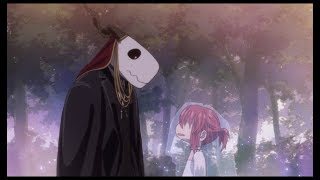
And it was. I immediately went to check if this whole conclusion was anime original and yep. This is where it overtook the manga. This ep was the shitty, rushed conclusion they tacked on to a story line that really, really needed more time to breathe. I have no idea why they’d want to do this, why they couldn’t just wait for the manga to finish this arc and end the anime there, but here we are.
I hope the manga will have a more satisfying conclusion to this storyline, that it will give the resolution the room it needs. Ideally, I’d like Chise to live apart from Elias for at least a while. She’s grown a lot, and she needs space to grow further and learn how to function without him. They’ve gotten dangerously codependent and it’s stifling her. Meanwhile, Elias especially needs to learn how to not treat Chise so possessively and taking time apart from her and respecting her wishes to be left alone would help him learn to do that. He needs to work on himself so he isn’t a danger to her. If they stay together right now, things will only get worse.
The manga is about their relationship, so I have no doubt they’ll eventually reunite, but I want to see it happen only after Elias proves he’s changed significantly and after Chise is allowed to become more confident and independent. I hope the manga delivers on that and tells a satisfying story where the characters actually grow, that treats the issue of abuse and toxic relationships seriously, that gels with the stuff that came before.
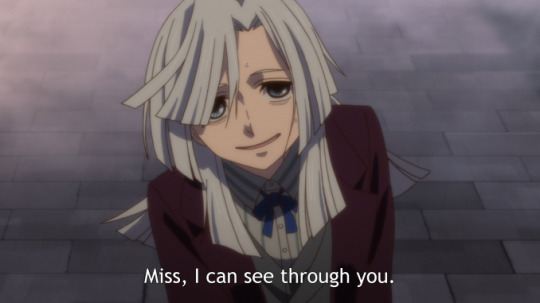
Of course, there was other stuff going on in the midst of Chise and Elias’ emotional journeys. We learned the Cartaphilus backstory and it was actually pretty interesting stuff. it fully explored exactly how horrific it would be to wander the earth and never die- Cartaphilus was being punished for a crime that was so long ago he couldn’t even remember what it was. When he finds out it was “threw a rock at the Son of God” he’s like “wtf just for that? other people did way worse shit!” and you have to agree with him. It also offers the ishiness of using Cartaphilus as an antagonist a bit by making it clear he only started killing after fusing with a boy named Joseph. In fact, the Cartaphilus part of Joseph seems mostly benign as he was the one who tried to talk to Chise.
So it’s a compelling take on an old story. Lots of parallels are made between him and Chise, he’s a great antagonist thematically. The conclusion...well like everything in the last episode, it was rushed, weird, and I couldn’t really tell what was going on. Hopefully the manga's version will be better.

I enjoyed a lot of this anime- the rich fantasy world, the exploration of trauma, the complex characters- but the last episode was just so infuriatingly BAD that it damaged the narrative as whole. It undid and contradicted most of the positive things about the story. It just left me feeling skeeved out.
So in the end, I don’t recommend this anime. Because you’re better off reading the manga. I went through it, and it was better paced than the anime overall, has many details that strengthen the story and the emotional beats hit much harder. Watching the anime can be a confusing experience at times, but the manga is much easier to follow. I feel pretty confident based off this that however the manga wraps up the current arc, it will at the very least be slightly better paced and executed. So be kind to yourself, and go with the better version of the story if you’re interested in this. And cross your fingers for a good ending.
#anime overview#the ancient magus bride#devilman crybaby#winter 2018 anime#mahou tsukai no yome#mahoutsukai no yome#hatori chise#chise hatori#elias ainsworth#anime#abuse cw#suicide cw
49 notes
·
View notes
Video
youtube
Ninety One, “Yeski Taspa Bii’,” from Qarangy Zharyq, released as a single June 2017
We’ve talked about the social and political significance of Ninety One recording in Kazakh, but we haven’t yet discussed the implications of their not recording in English. And yet it’s clearly something the group and Juz Entertainment has been thinking about, since all four of the Qarangy Zharyq singles were posted to the official YouTube channel with built-in English and Russian subs, as well as the lyrics printed out in Kazakh, Russian, and English.
How much non-fluent fans should care about the nuances they’re missing is going to remain an individual decision. For my own part I think generally you’re better off finding a translation, if you can; there are certainly songs for which having a translation at hand has influenced my perception of the song, positively or negatively. But I also will freely concede that lyric comprehension is sometimes beside the point. Any English-fluent listener who enjoys Duran Duran, whose lyrics are legendary in their total muddle-headed-ness, has no business getting pissy about translations.
(You own the money, you control the witness / I leave you lonely, don’t monkey with my business / You pay the prophets to justify the reasons / I heard you promise but I don’t believe it / That’s why I did it again, and I love that song but WHAT.)
Now: “Yeski Taspa Bii’” is not one of those songs for which lyric comprehension is beside the point, and not just because presumably AZ and ZaQ (again) worked hard on the lyrics. There is a lot going on, maybe even more than in “Su Asty”: a throughline that melts away when the rapping starts, and sections that sound as if Bala were sent into the recording booth to do a kazoo solo sans kazoo, and also a particular minor key that somehow grips my heart and twists it, and thus every time Alem starts with that Ескі таспа жиі nonsense I want to bang my head against a wall.
(also God help us all, five music videos in and now Alem reveals that he actually does know, quite well in fact, how to look at a camera. Congratulations, good sir. Now leave me alone so I can wail and rend my garments in peace.)
“Yeski Taspa Bii’” is ambitious, and possibly a mess, and even if it is a mess I am incapable of dismissing it, and I want to poke at it and prod at it and make it make a little more sense, a bit more of a case for itself. And thus, after the jump, some rudimentary, ill-informed attempts at translation.
Let’s just take Ace’s opening verse, for now:
Original Kazakh (Cyrillic text):
Байланған тілім сөйлемейді,
Айналама неге сенбеймін мен?
Кімге кіммін? Білмеймін, бермейді бір мұң тыным,
Бермейді тыным мұңның үні күні-түні
Official provided English translation:
I got tongue-tied as if I numb
why my environment seems deceitful.
Who am I? I do not even know what sadness does not give me peace,
that sadness haunts me day and night.
To my ear, as a native speaker of a watered-down version of Classical Southern American English, three of the four translated lines are hard to sit with: the missing verb in “I numb,” the double negative of “I do not even know what sadness does not give me peace,” the fact that American English speakers generally use “deceitful” to describe actions rather than settings. Of course there will be differences in reading between English speakers, native or not; and in trying to translate the verse into something that reads as less confusing and more illuminating of AZ’s and ZaQ’s intentions I’m of necessity imposing my understanding of English. Translating is politically difficult, too, it turns out. (You’re all shocked.) Fortunately I have the official provided translation to balance against, without having to worry that I’m speaking over Ninety One.
Google Translate has been letting me down but let’s give it a chance:
Linked slices speak,
Why do not believe in and around?
Who am? I do not know, not one of sorrow, peace
PAIN tone rest not day and night
...go home and think about your algorithm choices, Google Translate.
Okay, let’s back up a bit. What is this song about? It’s a breakup song, sure, but there’s a lot going on here to contort the narrative. There’s that repeated non-kazoo interlude, for one thing, that cuts hard against the singers’ wallowing in their own misery; the music credit this time around goes to Alem and Bala plus Boss Yerbolat, and I find it hard to believe that all three of them heard that distorted sample and said, “Yes! Romantic misery!” Meanwhile there are multiple repeated mentions of time and of music, but the chorus’s “Your music heals all my wounds” leads to AZ’s laments over a “dusty record” that warps and stains as it plays. Not to mention a seeming thread of self-loathing. I mean. Why should I carry the corpse of happiness? There’s more than mourning here; there’s annihilation.
The video actually does less to help explain the lyrics’ intentions than I expected. Occam’s razor says that Ace’s scenes represent the idealized past and the other four are acting out the wall-smashing, milk-spilling, clothed-shower-taking misery of the present. Or the girl dumped the other four on her way to the beach with Ace. Or, given that she looks sad and wistful first, the self-loathing is her internal narration; maybe she’s the one whose psyche was laid waste by a bad breakup, and Alem and Bala represent the first stage of her showing her mine-strewn internal emotional territory to sympathetic new man Ace, AZ and ZaQ the second stage. (Or it’s the group lamenting the difference before the more innocent time of debut and the present, filled with tour bullies and entitled fans.) That’s a reach, admittedly, but you see how the video doesn’t actually help explain whether the sadness of the lyrics is just sadness or something more corrosive. Corpse of happiness may be overstating the case. Or may not.
Back to I do not even know what sadness does not give me peace: is the double negative supposed to be there? Is the narrator simply too sad to find peace? Or is the narrator saying that his inner turmoil is so great that mere sadness would be a relief?
So what I’m going to do next is try and translate word by word, paying attention to the repetition of бермейді бір мұң тыным in the third line and Бермейді тыным in the fourth. This is actually more difficult than I thought it would be: Kazakh-English dictionaries are not plentiful even on the so-called World Wide Web. (I miss Babelfish.) In the end I used Translatos, Glosbe, and Meta.ua. And got:
Байланған = tied, linked, strung together
Тілім = tongue / slice / language
Сөйлемейді = Meta.ua has this as “cannot speak,” Glosbe thinks it’s closer to “unable to lie.”
Айналама = surrounded (there may be an implied speaker in this: more like “[I am] surrounded”)
Неге = why, what was the cause of
Сенбеймін = don’t believe
Мен = I, me, my, mine
Кімге = to whom
Кіммін = who am I
Білмеймін = I don’t know
Бермейді = Meta.ua says “gives not”. Glosbe and Google Translate say “does not”. I’m guessing it might be closer to denoting that something does not happen than a verb in its own right.
Бір = one
Мұң = longing, sorrow
Тыным = rest, peace, tranquility
Мұңның = of sorrow
Үні = sound / voice / noise
Күні = day / date
Түні= night
So there’s a link in the third and fourth lines of the idea of sorrow, the idea of peace, and the negation of Бермейді -- hence the double negative of the official translation. Also there’s the potential of a contrast between the not-speaking of the first line and the use of үні in the fourth. Given all that, here’s my shot at a translation that would read as more “natural” to a native American English speaker:
Tongue-tied, unable to speak,
Why is everything around me a lie?
Who am I? I don’t know. There’s no peace to be found,
No rest from this pain that screams day and night.
If I had more time I’d continue this exercise all the way up to the corpse of happiness, but I think one verse is enough for y’all’s purposes. Obviously the rhythm’s all off, with the one-syllable English words more plodding than the original, and the repetition within Білмеймін, бермейді бір мұң is completely lost. And just perusing the Wikipedia entry on the Kazakh language gives you an idea on how much I’m not taking into account.
So to summarize: “Yeski Taspa Bii’” is a powerful song in its own right, but more so to Kazakh speakers; emo is emo in any language; even if you can’t understand the words there’s plenty of symbolism to go around; and translation is hard! Fortunately, next up you get to meet someone who’s better at it than I am.
introductory post / all Ninety One posts
9 notes
·
View notes